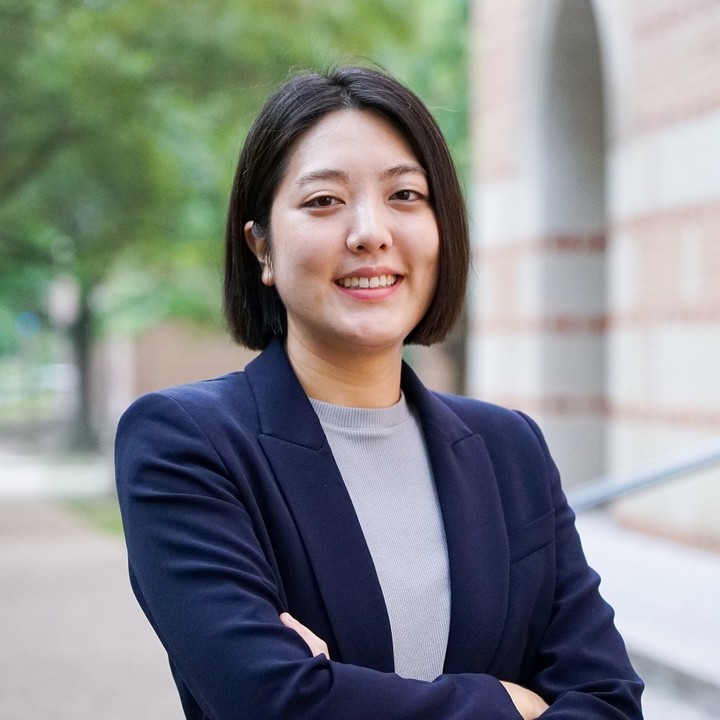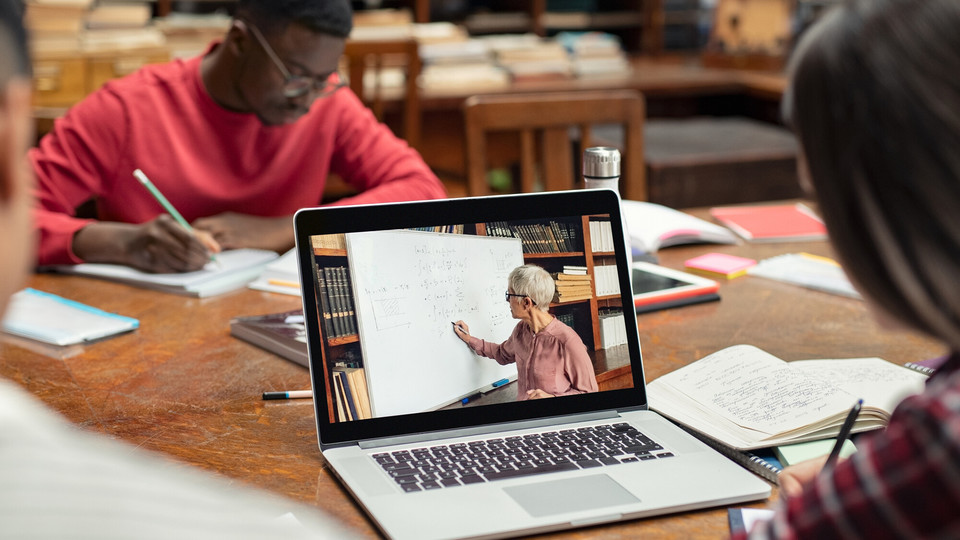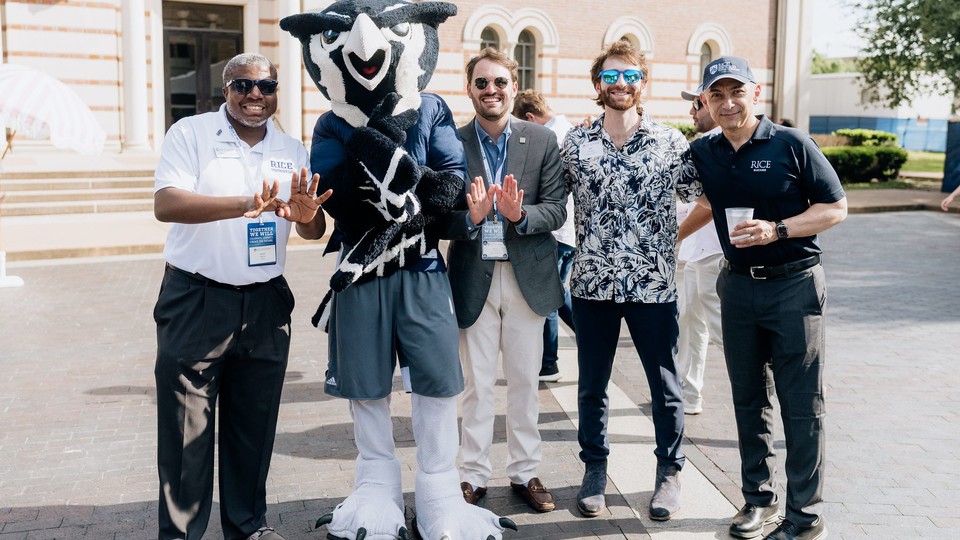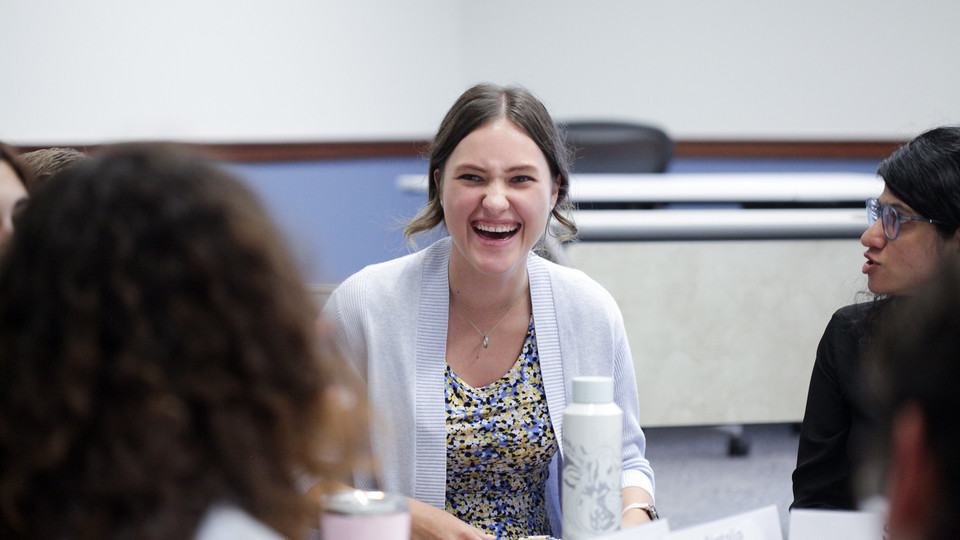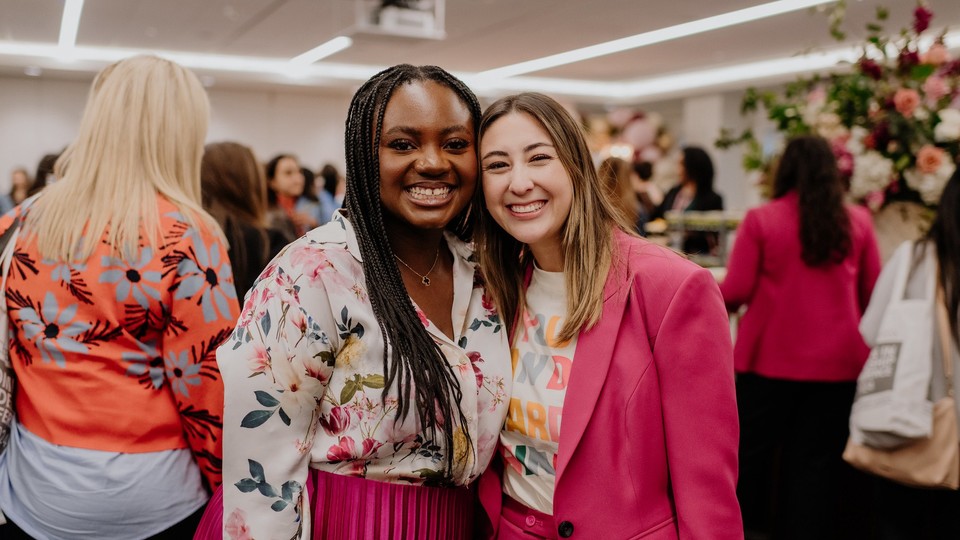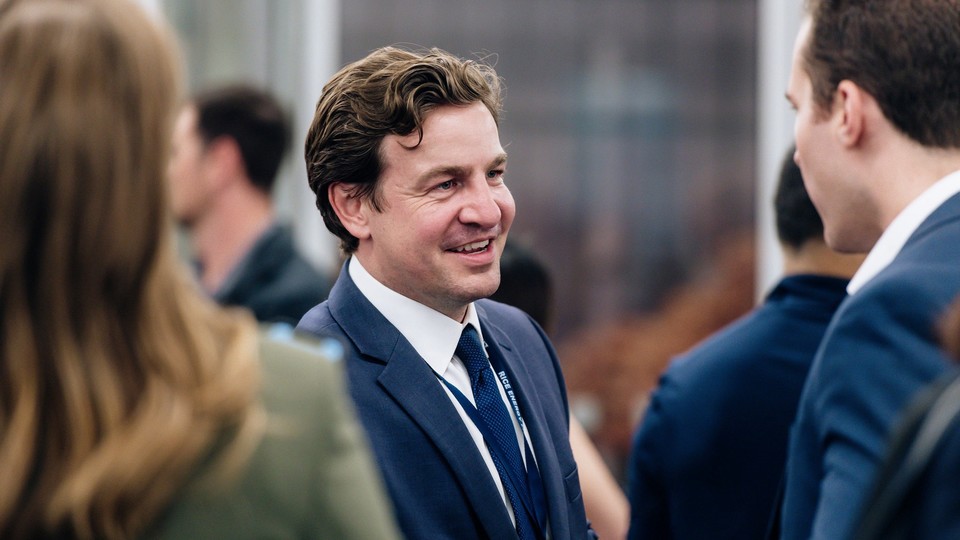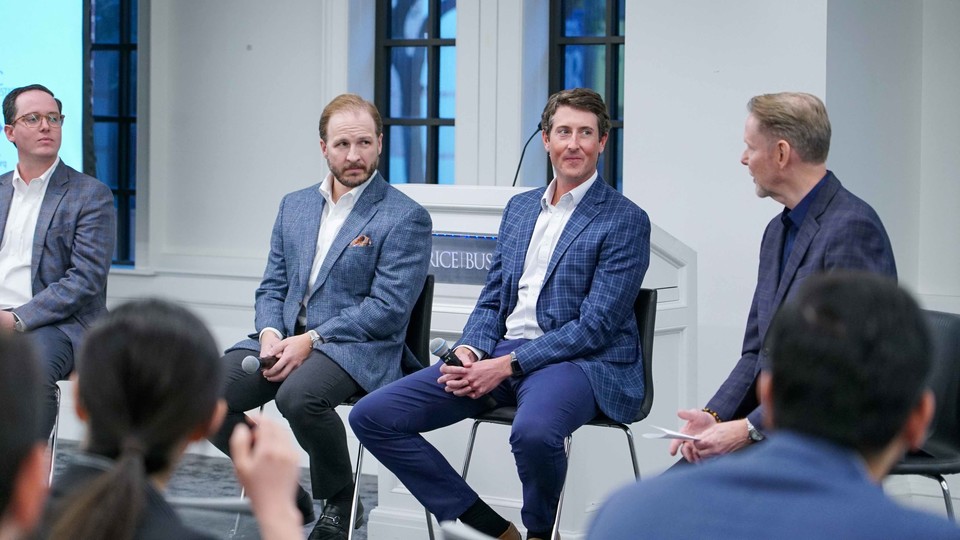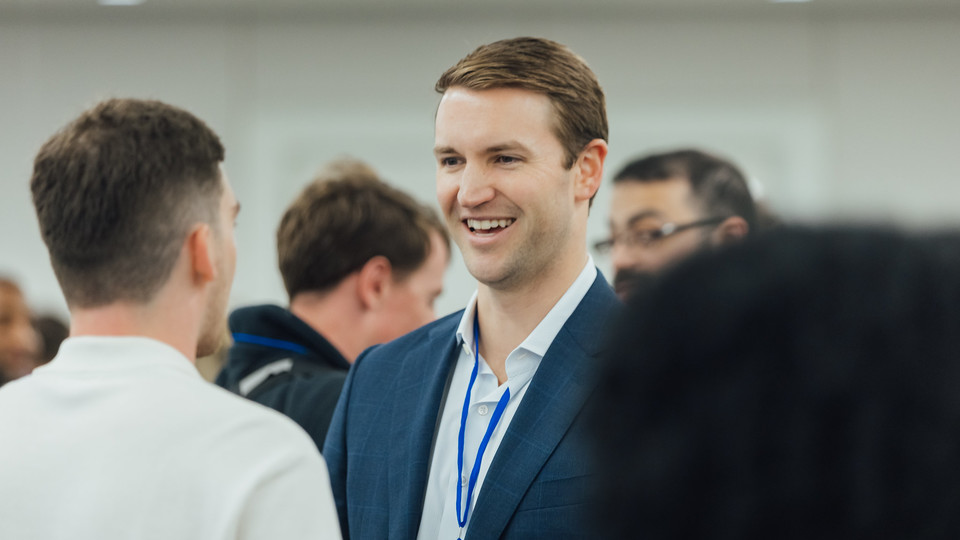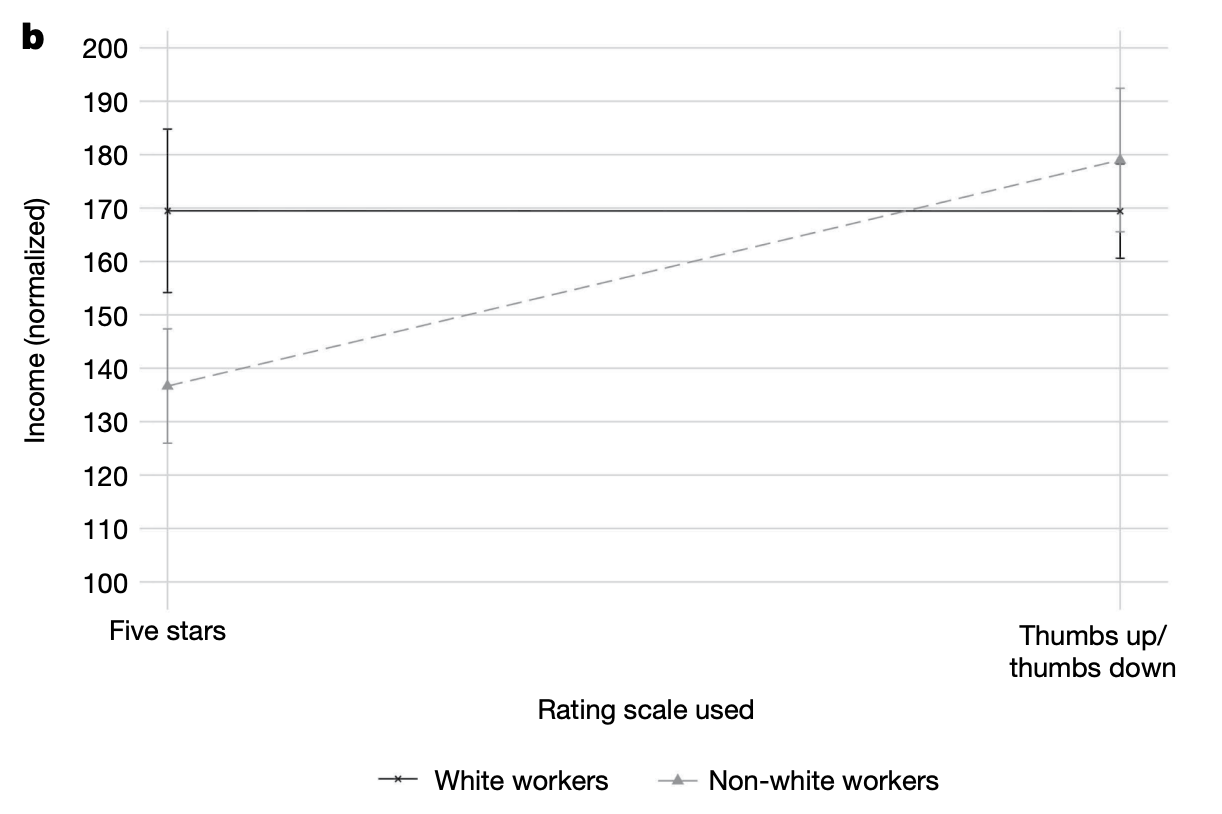
Bypass TOEFL, GRE, GMAT to Attend U.S. Graduate Schools
Some schools, including Rice Business, offer a GMAT waiver for their full-time MBA programs, based on factors like work experience or holding a professional degree from a U.S. college.

Female entrepreneurs face hidden barriers in mentorship networks
Gender segregation within mentorship networks plays a major role in limiting access to critical resources for female entrepreneurs, according to a working paper co-authored by Minjae Kim, assistant professor of management at Rice Business.
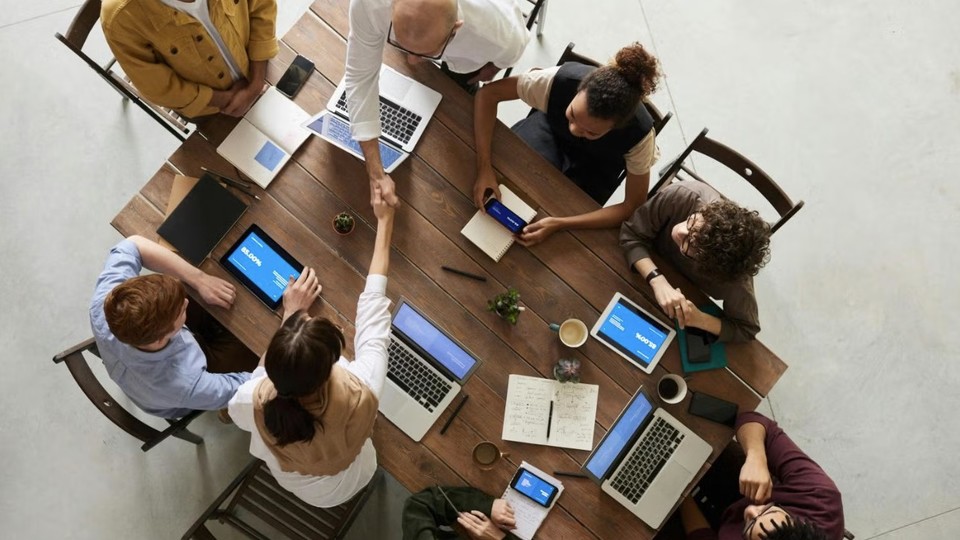
Thumbs Up: Fixing the Bias in Gig Work Ratings
When a gig-work platform switched from a five-star rating system to a simple thumbs-up/down, it eliminated a 9% racial earnings gap for their workers.


Based on research by Sora Jun (Rice Business), Tristan L. Botelho (Yale), Demetrius Humes (Toronto) and Katherine A. DeCelles (Toronto)
Key findings:
- Data from a home services platform revealed a 9% pay gap between white and non-white workers.
- White workers were 3.5 percentage points more likely to receive a perfect rating under the five-star system.
- Switching from a five-star rating system to a thumbs-up/thumbs-down scale eliminated this racial disparity entirely for new workers.
For millions of gig workers, customer ratings shape access to work, pay and financial stability. Over time, those ratings can come to mean more than simple feedback.
A new study published in Nature by Rice Business professor Sora Jun and colleagues at Yale and the University of Toronto reveals that racial bias quietly skews gig-worker ratings, affecting minority workers’ earnings. On one home services platform, the traditional five-star system created a 9% income gap: non-white workers were earning just 91 cents for every dollar their white peers made.
When the researchers analyzed 100,759 completed jobs and nearly 70,000 customer ratings from the U.S. and Canada, they found that minority workers consistently received lower ratings — a small but financially significant bias. But when the platform switched to a simple thumbs-up/thumbs-down system, the income gap disappeared.
“The numbers don’t lie,” says Sora Jun, assistant professor of organizational behavior at Rice Business. “We saw evidence that subtle racial bias was creeping into five-star ratings, quietly chipping away at non-white workers’ earnings. When the rating system was changed, the earning gap was gone.”
The Power of “Dichotomization”
Customer ratings influence earnings on many gig platforms. A single decimal point can push workers into lower income brackets, reducing their pay for identical work.
This study reveals that five-star rating systems create space for subtle discrimination, where customers score minority workers slightly lower, with a 0.07-star difference (4.72 vs. 4.79).
While this gap may seem small, it had significant financial consequences. For example, if a gig worker earns $40,000 a year, a 9% pay gap means they are taking home $3,600 less annually — purely due to biased ratings.
Multiply this across an entire workforce, and the financial impact is staggering. According to the World Bank, an estimated 154 million to 435 million people worldwide are working gig jobs online, up to 12% of the global workforce.
The research team tested their hypothesis in multiple ways. First, they analyzed real-world data from a platform that changed its rating system abruptly, without informing users of the switch.
“Five-star ratings can feel objective, but they’re anything but,” Jun explains. “They may give customers too much room to let their biases slip in. When we force people to make a dichotomous decision — yes or no — they focus on performance, not personal perceptions.”
Before the change, white workers were 3.9 percentage points more likely to receive a perfect five-star rating compared to non-white workers. But after the introduction of the thumbs-up/thumbs-down system, this gap vanished.
The researchers also ran controlled experiments, where participants were asked to rate identical work by either white or non-white workers using different rating scales.
The results were clear: racial bias was more pronounced in the five-star system and significantly reduced in the binary system. White and non-white workers received positive ratings at nearly identical rates (95.9% vs 95.4%).
“Five-star ratings can feel objective, but they’re anything but,” Jun explains. “They may give customers too much room to let their biases slip in. When we force people to make a dichotomous decision — yes or no — they focus on performance, not personal perceptions.”
The Bigger Picture
Bias in ratings is not just a problem for one company — ratings are used across the gig economy, which spans transportation (Uber, Lyft), delivery services (DoorDash, Instacart) and freelance work (Upwork, Fiverr).
Many platforms rely on customer ratings to allocate opportunities, promotions and even account suspensions. If ratings are biased, so are the economic outcomes.

The findings suggest that platforms can meaningfully reduce racial inequities with a relatively simple intervention. While diversity training and anti-bias policies are common in corporate hiring, they’re impractical for gig economy customers, who aren’t employees and can’t be required to follow training or bias guidelines.
Changing the way ratings are structured, however, is a simple and scalable fix.
One potential concern is whether switching to a thumbs-up/thumbs-down system removes valuable detail from customer ratings. The researchers acknowledge that binary ratings provide less nuance than a five-star system, but they argue this loss of detail is largely irrelevant.
In practice, most customers inflate ratings, with 85% already giving five stars, meaning the extra precision of a five-star scale is more illusion than reality. Platforms should ask themselves: do we care more about fairness or fake precision? Because right now, the status quo is costing real people real money.
“If we’re serious about tackling bias, we can’t just rely on people to be more self-aware,” Jun says. “We need structural fixes. And sometimes, the smallest tweaks — like changing how we rate workers — can make a big impact.”
Written by Seb Murray
Jun, et al (2025). “Scale Dichotomization Reduces Customer Racial Discrimination and Income Inequality,” Nature.
Never Miss A Story
You May Also Like
Keep Exploring
Rice Business Plan Competition, world’s largest and richest intercollegiate student startup competition, selects 2025 ventures
The 2025 Rice Business Plan Competition (RBPC) announced today the 42 startups invited to compete for more than $1 million in prizes April 10-12 at Rice University and the Ion in Houston.
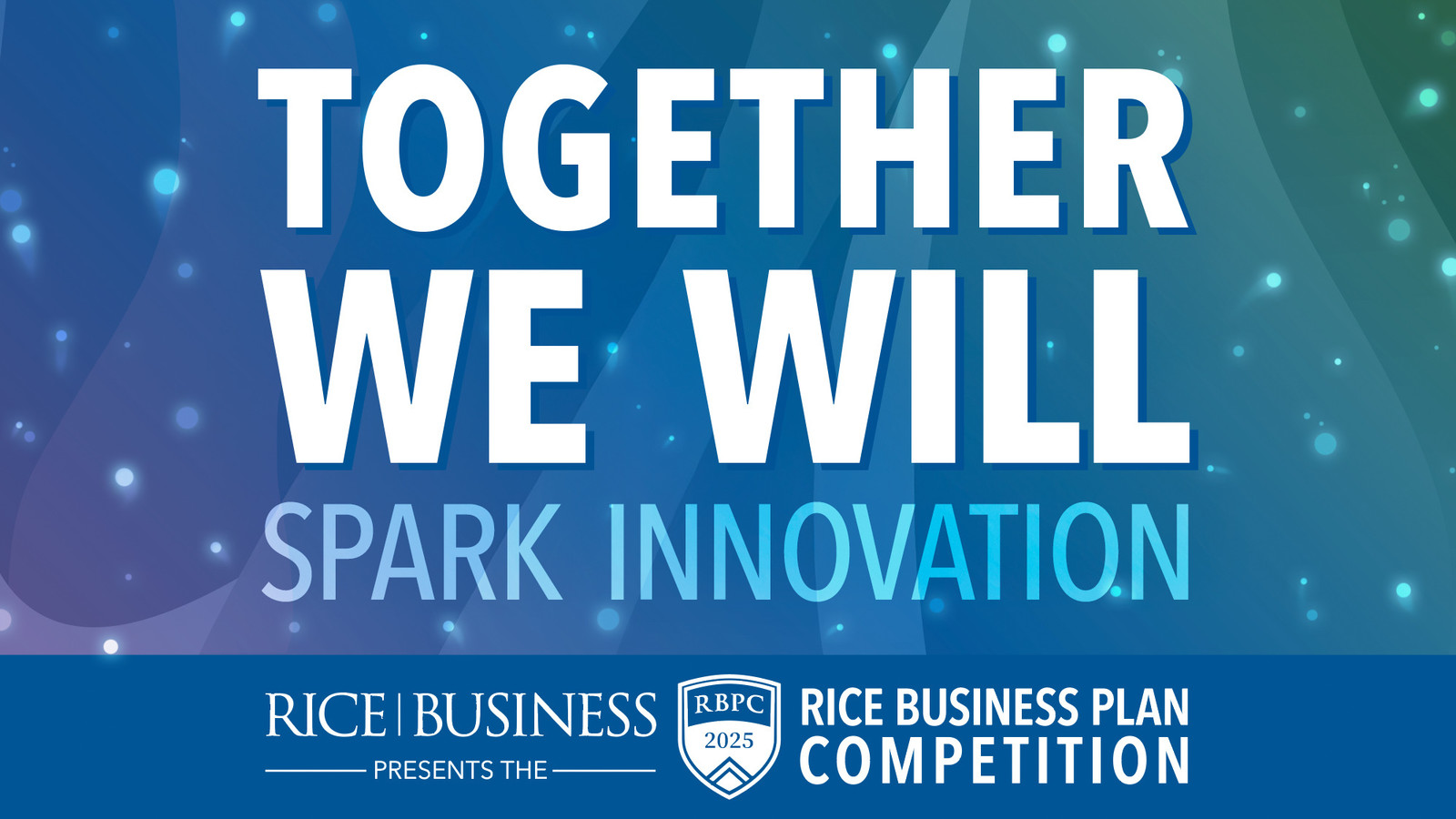
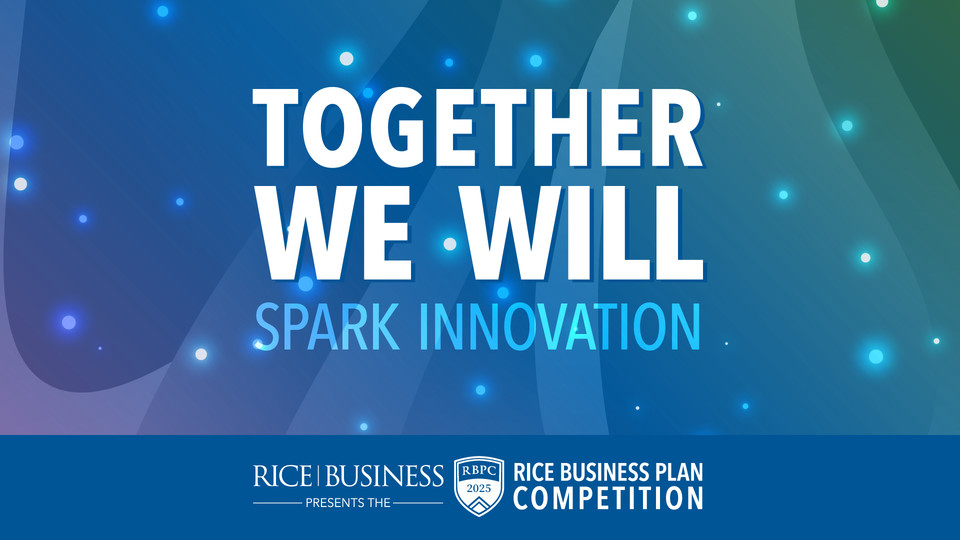
42 graduate student-led startups to compete for more than $1 million in prizes
The 2025 Rice Business Plan Competition (RBPC) announced today the 42 startups invited to compete for more than $1 million in prizes April 10-12 at Rice University and the Ion in Houston.
The RBPC, presented by Rice Business and hosted by the Rice Alliance for Technology and Entrepreneurship, brings together the best student ventures from top universities across the world to compete for prizes in front of more than 300 angel, venture capital and corporate investors and members of the business community.
In its most competitive year yet, the event’s judges, made up of venture capitalists, corporate leaders and entrepreneurs, selected 42 of the most investable startups among the applicants to compete in Houston. These ventures represent the very best in graduate student entrepreneurship from universities across the country and world — they are building cutting-edge solutions in energy, cleantech and sustainability; life sciences and health care; hard tech; digital; and consumer products. This year’s invited startups represent 34 universities from four countries.
The student entrepreneurs gain real-world experience to pitch their startups, enhance their business strategy and learn what it takes to launch a successful company. With a goal of not only competing for cash but also understanding what it takes to secure investment, raise awareness and launch a successful venture, these graduate students will pitch their companies through three rounds and three days of competition in hopes of taking home the grand prize.
The 42 ventures for RBPC 2025:
3rd-I, University of Miami AG3 Labs, Michigan State University Arcticedge Technologies, University of Waterloo Ark Health, University of Chicago Automatic AI, University of Mississippi Bobica Bars, Rowan University Carbon Salary, Washington University in St. Louis Carmine Minerals, California State University, San Bernardino Celal-Mex, Monterrey Institute of Technology and Higher Education CELLECT Laboratories, University of Waterloo ECHO Solutions, University of Houston EDUrain, University of Missouri-St. Louis Eutrobac, University of California, Santa Cruz FarmSmart.ai, Louisiana State University Fetal Therapy Technologies, Johns Hopkins University GreenLIB Materials, University of Ottawa Humimic Biosystems, University of Arkansas HydroHaul, Harvard University Intero Biosystems, University of Michigan Interplay, University of Missouri-Kansas City MabLab, Harvard University | Microvitality, Tufts University Mito Robotics, Carnegie Mellon University Motmot, Michigan State University Mud Rat, University of Connecticut Nanoborne, University of Texas at Austin NerView Surgical, McMaster University NeuroFore, Washington University in St. Louis Novus, Stanford University OAQ, University of Toronto Parthian Battery Solutions, Columbia University Pattern Materials, Rice University Photon Queue, University of Illinois Urbana-Champaign re.solution, RWTH Aachen University Rise Media, Yale University Rivulet , Dartmouth College Sabana, Carnegie Mellon University SearchOwl, Case Western Reserve University Six Carbons, Indiana University Songscription, Stanford University Watermarked.ai, University of Illinois Urbana-Champaign Xatoms, University of Toronoto |
The 2025 competition marks the 25th year for RBPC. Since its inception, the competition has grown from nine teams competing for $10,000 in prize money in 2001 to 42 teams from around the world competing for more than $1 million in cash, investment and in-kind prizes. Over the event’s two decades, 868 teams have raised more than $6.1 billion in capital with 59 successful exits.
For more information about this year’s RBPC, visit rbpc.rice.edu.
You May Also Like

Rice University’s Jesse H. Jones Graduate School of Business today announced the launch of its Graduate Certificate in Healthcare Management program, a 10-month, credit-bearing professional credential designed for current and aspiring leaders seeking deep expertise in the business of healthcare.
A third of Americans have more credit card debt than emergency savings, poll finds
Rice Business assistant professor of finance Benedict Guttman-Kenney weighs in on the topic of American credit card debt versus emergency savings.

Eat & Explore: Recommendations from the Rice Business Community
Ever wondered why Houston is known as a culinary and cultural capital? Check out our top recommendations for food, drinks and fun around Rice University and bask in the options — there’s something for every appetite.
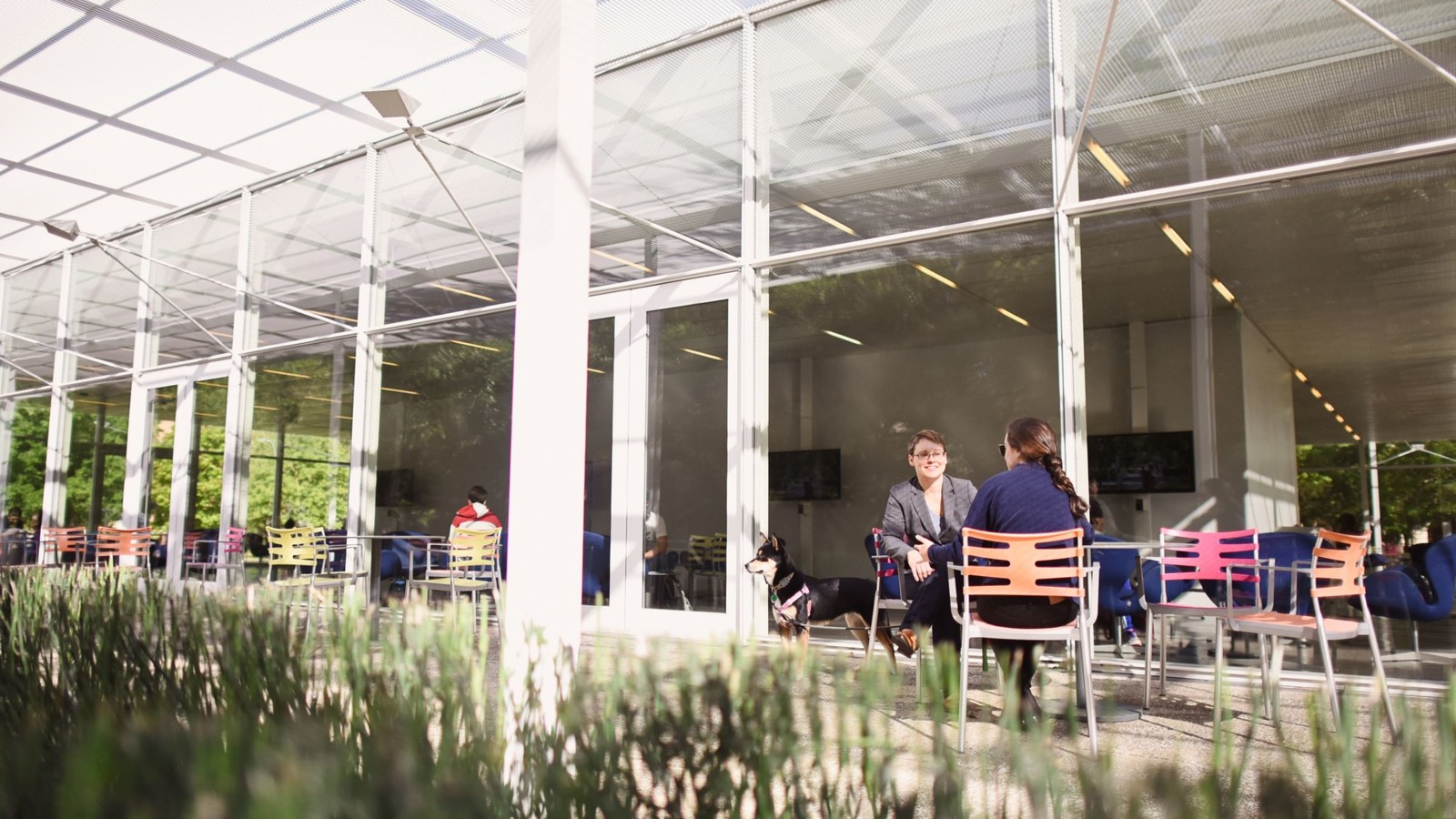
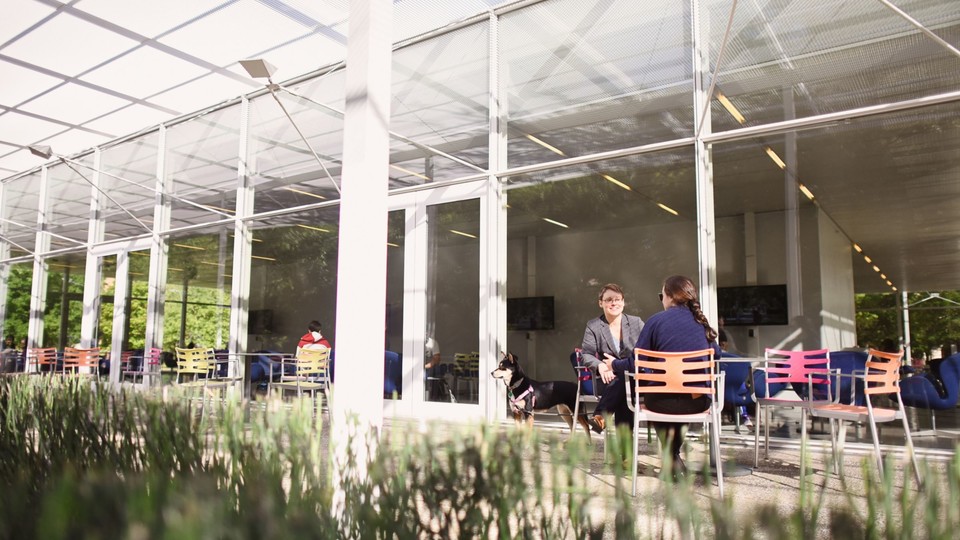
Houston natives will tell you that our city has the best food scene — and the numbers speak for themselves. Here in the “newest capital of great food,” Houston offers nearly 13,000 restaurants and cuisines from over 70 different countries and regions. On your first visit to the city, the sheer variety can feel a bit overwhelming.
To help you feel at home, we’ve created your guide to the best food, drinks and fun near Rice University, curated with insights from our students and alumni.
Just Beyond the Hedges
When you begin your MBA at Rice Business, you’ll discover that staying well-nourished is crucial to success. Explore these Rice Village treasures and other local favorites recommended by our Rice Business students:
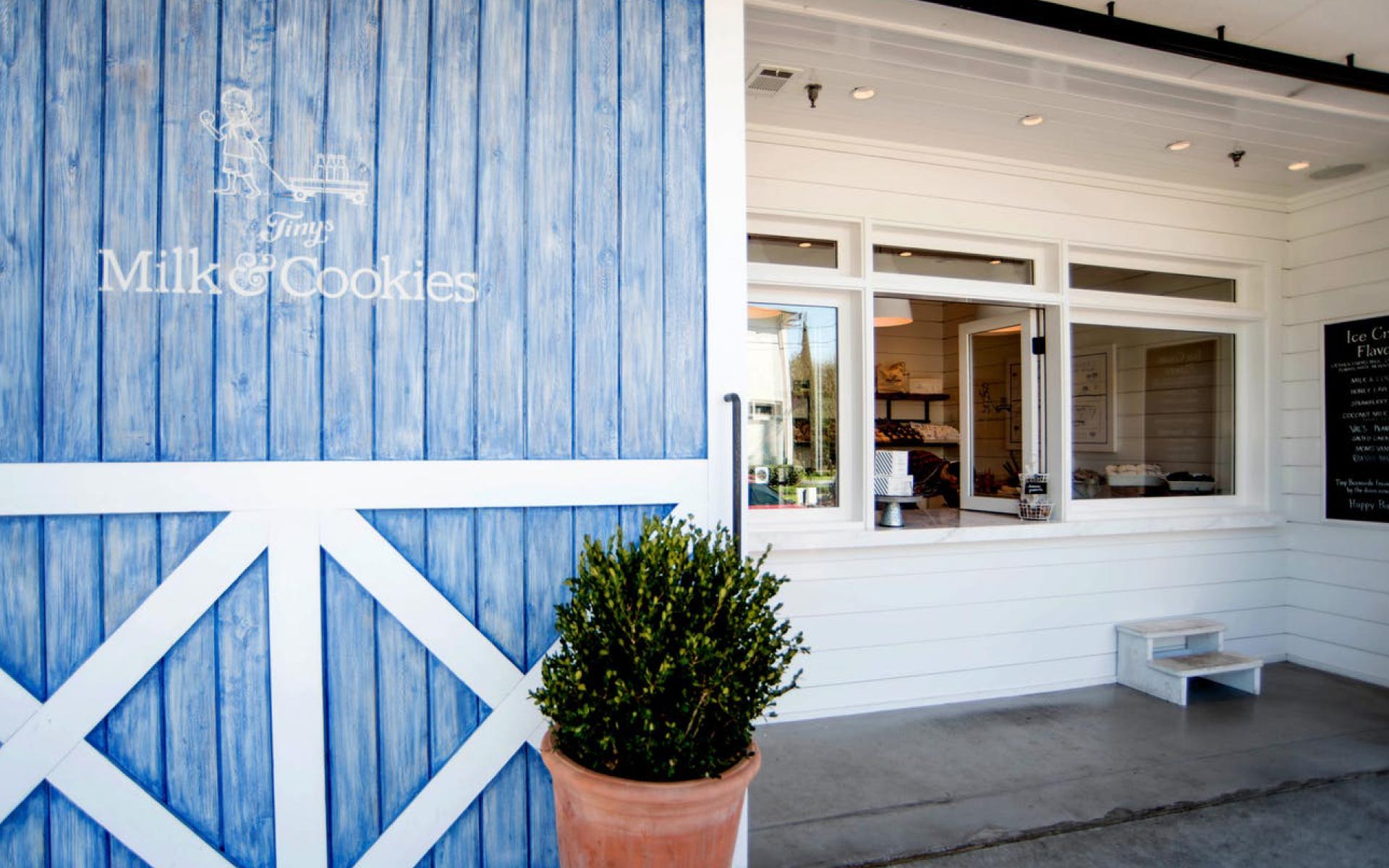
- Aga’s: Enjoy authentic Indian and Pakistani cuisine.
- MAD: Explore unique Spanish tapas, specially crafted cocktails and wine.
- Bitty & Beau’s: Refuel with friendly smiles and cafe favorites in Rice Village.
- Pappas Seafood House: Indulge in family friendly comfort food and support Rice Business alum.
- Blue Nile Ethiopian Restaurant: Explore Ethiopian classics in a cozy atmosphere.
- Tiny’s Milk & Cookies: Savor cookies, pastries, ice cream & espresso at this pint-sized joint.
- Katami: Embrace modern Japanese cuisine, voted No. 1 Best New Restaurant in Texas.
Interested in Rice Business?
In the Family
Our alumni-owned and operated restaurants serve some of the most unforgettable flavors in the city — helping make Houston one of the top foodie cities in the United States. Fuel up at one of our local alum-run restaurants:
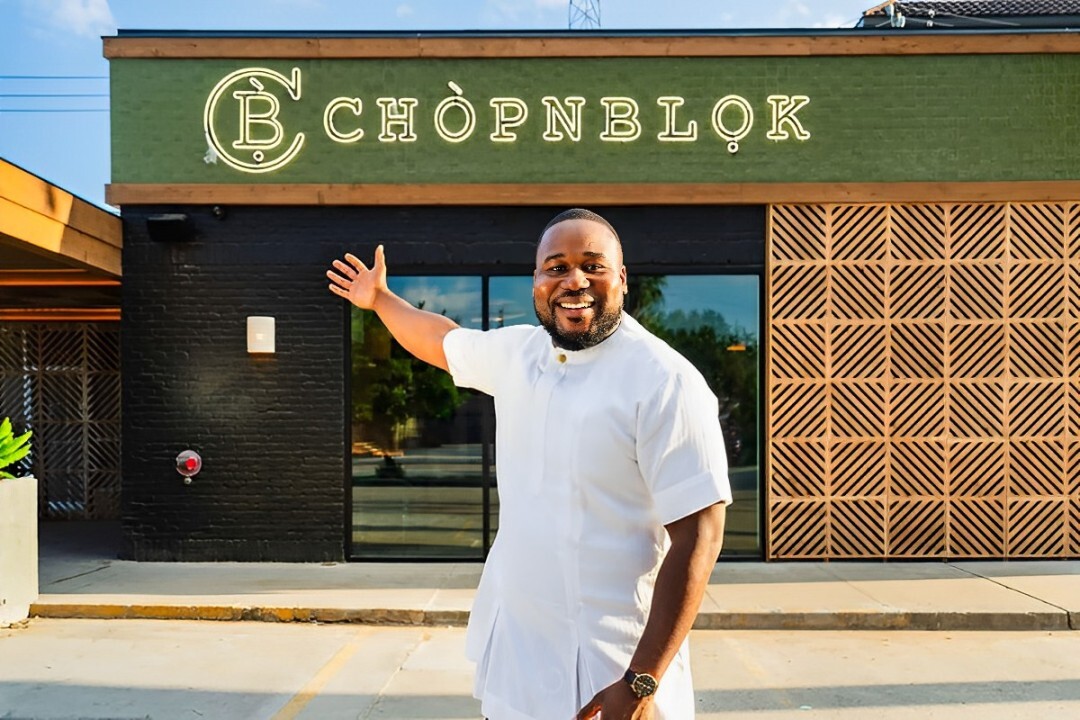
- ChòpnBlọk — Ope Amosu ’14
Inspired by the vibrant flavors of West Africa, this fast-casual restaurant fuses Chef Ope Amosu’s Nigerian heritage with Black American Southern influences. Dive into the city’s thriving West African food scene with the craft dishes, like smoky jollof jambalaya, that earned Chef Amosu James Beard semifinalist nods for Emerging Chef of the Year (2024) and Best Chef in Texas (2025).
- Kiran's — Puja Verma ’12
Chef Kiran Verma, 2023 James Beard semifinalist for Best Chef in Texas and ‘godmother of Indian fine dining,’ is the namesake behind Kiran’s. Run by Kiran’s daughter and Rice Business alumna Puja Verma ’12, the Upper-Kirby restaurant features elevated Indian cuisine with entrees like chili tikka, apple fennel chicken naanzza and navrattan korma.
- Treebeards — Jolie Stinneford ’01
Serving locals since 1978, this alumni-owned gem offers Southern comfort flavors at locations in Downtown and Memorial-area Houston. Stop in for a bite and enjoy regional dishes like duck gumbo, shrimp etouffee, or red beans and rice.

Don’t forget to treat yourself to some authentic Tex-Mex or a plate of brisket while you’re in town! If nothing else, these trusted recommendations from Food & Wine will convince you to stay.
Things To Do Out and About
After indulging in Houston’s vibrant culinary scene, why not explore some of the city’s hidden gems? Between the arts, outdoors and sciences — this city has it all.
Experience a variety of arts and cultures in the Museum District or enjoy a breath of fresh air with beloved wildlife at the 55-acre Houston Zoo, located within Hermann Park. While in the area, relax with a cup of tea at the beautiful Japanese Garden at Hermann Park or with a show at Miller Outdoor Theatre, Houston’s beloved outdoor performance venue.
To make the most of your experience, immerse yourself in the local arts and sports. Enjoy an evening performance by a renowned arts company, or catch a game at one of our major league stadiums — home to the Astros, Rockets, Texans and more.
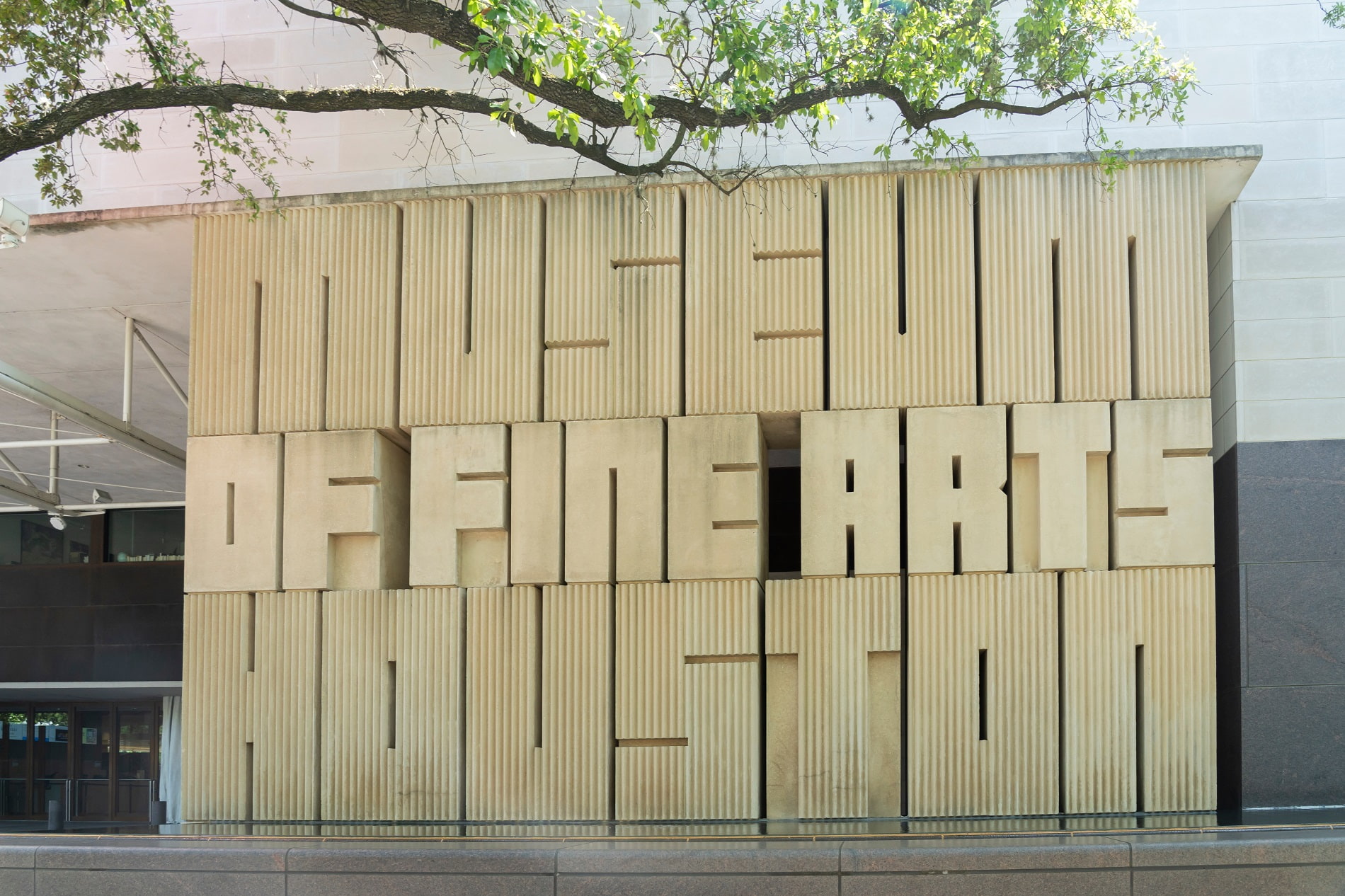
Take a quick drive to Space Center Houston, where NASA displays its iconic spacecrafts and exhibits, or venture into the city and visit the Houston Farmers Market, the city’s largest and oldest community market. When you’re ready to head back to campus, stop by Rice Village, where you’ll find 16 blocks of local boutiques and shops.
Here in the nation’s fourth-largest and most diverse city, there are always new restaurants to try and places to explore. Dive into the city’s rich and diverse community and you’ll find there’s no better place to begin a new chapter.
Ready to take the next step? Explore our Full-Time MBA program.
Continue reading about what makes Houston special...

There's lots to love about Houston — from the amazing local restaurants to the vibrant arts scene. For those considering graduate school, choosing the right location can transform your MBA experience.
You May Also Like
Keep Exploring
Transforming Everyday Products feat. Tanu Grewal ’05
Season 5, Episode 1
Tanu chats about her early marketing days at Coca-Cola in India, the strategies she gained from Whirlpool for understanding consumer behavior and leading brand strategy and product development at AlEn USA.
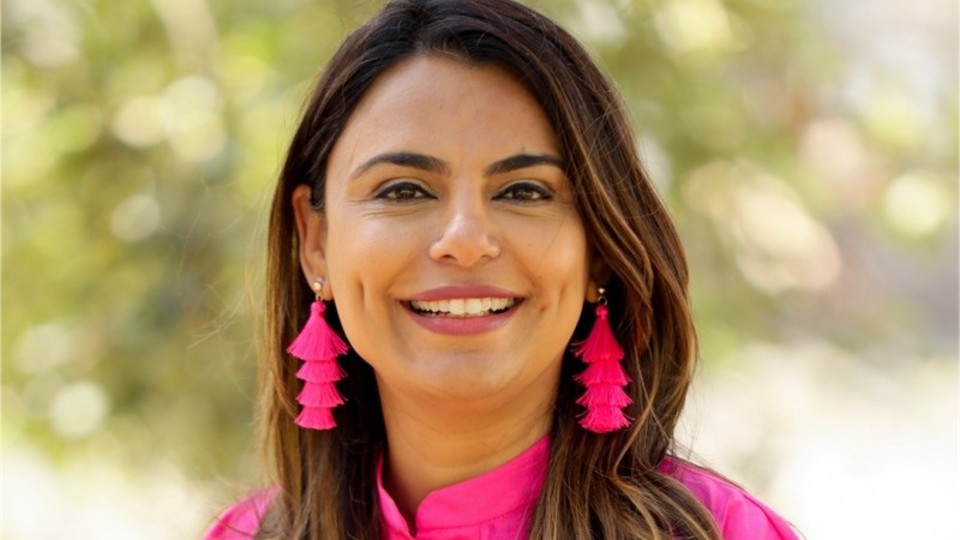
Owl Have You Know
Season 5, Episode 1
Tanu Grewal ’05 knows that you can learn a lot about a person’s buying habits based on what brands are in their cabinets at home.
Tanu is a global marketing leader. In her roles at Coca-Cola, Whirlpool, and Kohler, she helped revolutionize iconic products used by millions of consumers in their homes everyday. She has continued this work as the Vice President of Marketing at AlEn, a Proctor & Gamble-like company with products in 95% of households in Mexico.
In his debut episode as the new co-host of Owl Have You Know, Brian Jackson ’21 sits down with Tanu to chat about her early marketing days at Coca-Cola in India, the strategies she gained from Whirlpool for understanding consumer behavior, and how she’s innovating at AlEn for different markets in the U.S. and Mexico.
Subscribe to Owl Have You Know on Apple Podcasts, Spotify, Youtube or wherever you find your favorite podcasts.
Episode Transcript
-
[00:00]Brian Jackson: Welcome to Owl Have You Know, a podcast from Rice Business. This episode is part of our Flight Path Series, where guests share their career journeys and stories of the Rice connections that got them where they are.
I'm your host, Brian Jackson. And today, we have the privilege of speaking with a global marketing leader who has helped revitalize iconic brands, launched award-winning innovations, and continues to push the boundaries of what it means to be a purpose-driven leader.
Joining us today is Tanu Grewal, Rice MBA class of 2005 and vice president of marketing and innovation at AlEn USA. With over 15 years of experience in consumer products, luxury, and hospitality industries across Europe, the U.S., Middle East, Africa, and India, Tanu has built a remarkable career as a strategic marketer and brand builder.
Tanu, welcome to Owl Have You Know.
[00:54]Tanu Grewal: Well, thank you, Brian. Really happy to be here.
[00:57]Brian Jackson: Well, I'm very happy to be with you, especially, it’s my first episode as host of Owl Have You Know. Really want to start at the beginning of your incredible journey. Your career has spanned multiple industries and markets across the globe. I really want to know, what drives it? What first inspired you to pursue a career in marketing and brand building?
[01:19]Tanu Grewal: You know, that's a really interesting question. I think, at a very young age, I was really drawn to anything advertising and marketing. And I just felt that that had such power to, you know, really persuade people, drive people's decisions, and really, drive people's lives and impact lives. So, that was, kind of, what brought me in to start exploring branding.
And then I did my first internship while at Rice MBA at Coca-Cola, I actually went back to India and did the launch of a brand of tea and coffee, which is very strange because Coca-Cola is not a tea and coffee, kind of, brand, but they had launched a brand called Georgia Gold in Japan, had done really well.
And so, they wanted to replicate it in India, which is a big tea and coffee-drinking country. So, I went there and, kind of, really did, you know, the whole shebang, from going out on sales calls, working with the ad agency, working with the product, people. And that was it. That was the start of my love for marketing. I got hooked. And the rest, as they say, is history.
[02:23]Brian Jackson: So, in that pursuit and going back to India, did you draw on any cultural experiences, your background, in order to really understand this market?
[02:34]Tanu Grewal: Absolutely. So, like I said, the biggest competition for the brand was tea and coffee. And tea and coffee is, you know, brewed in people's homes. And to convince them to have, like, an out-of-home consumption. And this was, by the way, dispensed through a machine. So, a tea machine or a coffee machine. It was a very novel concept back then. So, really lots and lots of learnings on how to convince people, what are the, really, sort of, psychological motivations for someone to do that, how do you convince them that this is good quality, that it's worth, you know, the money to be spent, that it's something special that you can't make at home? So, lots of really, you know, interesting things. And I think it was, kind of, nice that I could go back and do this in India where I had grown up and I had that cultural nuance of tea drinking and coffee drinking habits.
[03:24]Brian Jackson: Yeah. I mean, the idea of tea, right? It's sitting down, it's home, it's comfort.
[03:29]Tanu Grewal: Exactly.
[03:30]Brian Jackson: Going to a vending machine and trying to convince folks that it's the same product…
[03:36]Tanu Grewal: Mm-hmm. And tea is so personal, Brian. Everybody has their own recipe for tea, right? Some people will put ginger in it. Some people will put cardamom in it. Some people will put, like, a whole, you know, we call it the tea masala. And again, it was so personal. But really, there were really good insights. You know, there was a lack of hygienic out-of-home consumption opportunities. So, there's at-home consumption. And then there were the what we call the tea wallahs, right? I mean, the roadside vendors selling tea, but their hygiene was, kind of, iffy. So, you know, the people were drinking that in a bind because it's a habit, right? You're out of home, you're in the office, you're running around, you're shopping, and you really crave that cup of tea. But the only place to have that was, you know, that roadside, kind of, guy. And you, kind of, are, like, you know, betting your life and drinking that cup of tea.
And so, I think that's where really… the machines were, you know, manufactured in Italy. And, you know, that you could customize your tea. And it was really just a very, very hygienic way. And, of course, the quality, its consistency, every time you could expect the same taste and the same level of whatever you had put in it, ginger or whatever. And those things were, really, I think, very different. And then we also chose to partner with McDonald's, which, again, I think was a big boost because that is where you expect a dispensed, kind of, beverage. So, just, yeah, it was really, really, really interesting.
[05:00]Brian Jackson: So, you know, you've also transitioned and you moved and you went across, it looks like, Europe, Middle East, Africa, eventually landed in the U.S., you know, working across these markets. What key challenges, opportunities have you seen? How did you navigate those?
[05:18]Tanu Grewal: So, yeah, that's a great question. I think one of the things that has really benefited me and I think, in a lot of places, is, I've spent most of my time in India and in the U.S. and then I did the expat in Europe. But just really, truly understanding the consumer has been a very, very, I would say, something that has helped me navigate the changes, not just in my industry and location, but also just trends, the marketplace and all that.
And I landed up in St. Joseph, Michigan, a very small place, right after my Rice MBA. You know, I needed an H1B, Whirlpool Corporation was based in St. Joseph. They were ready to do one. And they had a really great leadership program. You know, all the stars, kind of, aligned, and I went there.
By living in that small town, I got this really in-depth understanding of the American consumer that I don't think you get if you live on the coast or in a big city only, right? True America doesn't live there. True America who CPG wants their products to be consumed by lives in these smaller towns in the real America. So, I got a really good taste of that. And, you know, back in India, I had… my dad was in the army. We moved around a lot. So, I had had the opportunity to really, kind of, immerse myself in different cultures and really have the ability to talk to different people.
So, I think that's what it is. And even when I went for my expat assignment, I was managing 33 countries in Europe, Middle East, and Africa. And the first thing, you know, I said was, “I need to understand people.” So, we went out and did focus groups in different cities to really understand what does the brand mean to someone in France or somebody in Germany or in Israel. And I would recommend every marketer to really study there. And once you get an understanding, don't just stop there. Keep doing this, right? Because people change, people evolve, things around the people evolve. And I think the pace of change, if anything, has just, kind of, 10xed, right? So, that's, kind of, my secret sauce.
[07:14]Brian Jackson: So, really curious, in trying to get to know the consumer and, I mean, focus group, I think, absolutely, what do you do beyond that? How do you really connect with the small town? Let's say, for example, American. What matters to them? What is their concern with the product?
[07:31]Tanu Grewal: Great question. I find in-homes are really telling. You know, focus group, it's a great way to, kind of, get some understanding, right? But it's a manufactured, sort of, situation. And there's a lot of other dynamics, right? I mean, people will follow the most loud person and, you know, all of that.
In your home is what you truly are. And I have done a lot of in-homes, and some of them have been really interesting. You're like, “Whoa!” But it is very, very telling, right? So, when people are in their homes, first of all, they feel more relaxed and at home, of course, because they are in their home environment. But you can then go and say, “Hey, let me see you doing laundry,” or, “Let me see you clean or cook. Or, let me see what you have in your laundry cabinet.” And it's funny how many times they'll tell you something and then, when you open their cabinets, there'll be a completely different set of brands in there.
And sometimes, it even tells you that people don't pay that much attention. They're not trying to lie to you. They just don't pay that much attention to the brand. That tells you a lot as well. So, I think in-homes are really, really good. And now, with digital diaries, you have the ability to do a lot of these things online where they get a certain set of assignments. And again, you can do the in-home walkthrough digitally with somebody. And those are really, really telling as well.
[08:55]Brian Jackson: I would be terrified to have you walk through my home.
[09:01]Tanu Grewal: It is. I don't know if you know that, Brian, but when you go into people's homes, like, every category that I've ever worked for, I look at people's brands and I judge them.
[09:12]Brian Jackson: That's what I'm saying. I'm not going to have you over, Tanu. I'm sorry. I'm not willing to be judged. I can't. By what fabric softener I use or dishwasher detergent, I don't know what it says.
[09:23]Tanu Grewal: Or even, like, appliances. I mean, that was a big part of my life. Like, you know, it's just some second nature, right? You're like, “Oh, what lines do you have? Why did you buy this?” It's just really… I think consumer behavior is fascinating.
[09:35]Brian Jackson: Well, it is. I mean, you've taken iconic brands, right? Coca-Cola is one you've mentioned. Your past has been with Maytag, Whirlpool, Kohler, I mean, two of which I know are in my home. How do you work with a brand that is a household name, take it from something that seems reachable for everybody, but turn it into aspirational? How do you approach a product like that?
[09:59]Tanu Grewal: You know what? That is a great, great point. And I'll tell you an example, right? So, Whirlpool and Maytag, very different, kind of, similar things, though. They were really iconic brands and they were really a part of people's, like, people grew up with those brands. They were 100-year-old brands by the time I was working on them.
And then what happens is new entrants come into the picture, right? So, LG and Samsung were coming into the picture. There were electronic companies, to begin with. So, they were putting, like, oh, there's a big TV on the refrigerator. Do you really need it? No, but does it look really nice when you go shop for it? You're like, “Yes, I'm going to be looking up those recipes on that.” Of course, right?
And so, I think what ended up happening is, Whirlpool started to get this reputation of being literally somebody in a focus group who said, “That's my grandma's brand,” right? And that was a really, sort of, jarring moment. And we said, “We have to do something,” because we have all this, you know, we used to call it purposeful technology back then, like, technology not for the sake of technology, but because it actually does something, it forms a function, it enhances your life in some way, shape, or form. And so, we weren't doing a good, I think, communication of it.
So, we went out and started to do… we did a new campaign. We went to CES. So, CES was something we would go and have, like, a, kind of, like, a little washing machine and all that in a corner. And I had, you know, when I went to Europe, I had seen how the Europeans did their shows. And they know design and aesthetic. And I mean, that was something I really learned in my time there. There's a big show that happens in Milan every year. And we had put up a booth. And boy, that was a production. It was gorgeous. There were chefs cooking. There was, like, the whole thing there.
And then we came to CES and I told my boss, “We're not going with the sad-looking booth. We're creating, like, a nice booth that really conveys the story of who we are.” So, we actually did that. And it was really, everything in that booth was supposed to convey this idea that we are a technology-forward company as well. So, we actually went out all over the world. So, we had, you know, we had Asia and we had design centers there. And these design centers, they're always doing forward-looking, you know, like, concept cars. There's always concept appliances that we were creating, which is not sharing it. So, we actually created prototypes of those. And there were, like, really cool things. Like, there was this big fireplace kind of thing where it had a hot zone and a cold zone. You can cook on it, but you could keep your drink cold. This was supposed to be like in your living room. And we had a couple of these kinds of really nice things.
And then we bought some of our designers from all over the world to be able to talk to these things with the agency. We created this, you know, really big social media plan for the first time. We were live streaming with influencers from the booth. And I'm talking about, like, many years ago, right? So, this wasn't normal back then.
And so, really, what we had was, as an end result, we had people walking into the booth saying, “Oh, my god, I don't believe this is Whirlpool's booth.” It was like a dissonance in what they were expecting and what they were getting. And that's exactly what we were going for. So, that's sometimes you have to, kind of, do something a little jarring like that to really massively change perceptions.
[13:14]Brian Jackson: So, I mean, you're working in a crowded market, right? You talk about LG, Samsung, Whirlpool, Maytag, I guess, Speed Queen..
[13:22]Tanu Grewal: Speed Queen!
[13:24]Brian Jackson: All I know is, when I went to go buy a washer and dryer, my dad swore that Speed Queen was the machine I had to buy.
[13:32]Tanu Grewal: Oh, really?
[13:33]Brian Jackson: I was not willing to fork up Speed Queen money, but ended up with a Maytag. And he was okay with that.
But when you're working in a crowded market like this, if you're talking about standing out, being innovative, I think, is a huge part of that. What else do you see? You know, what other strategies are there?
[13:49]Tanu Grewal: I really think that understanding what the consumer needs that some nobody else is giving them, right? And then giving it to them in the right, sort of, pack size or format at the right price point and being available where they shop, classical for peace, right? You have to get that right. And research, again, like I was mentioning earlier, it's, you have to, kind of, get into the, sort of, really nitty gritties and get that one little nugget that is the one insight that really can change a lot of different things.
I'll give you an example. In my current role, we make cleaning and laundry products. And we were going into the market with…we have a very well-established fabric softener. It's actually the top selling fabric softener in the country. I mean, I won't mention competitor names, but the big ones, we sell more than that on the same shelf, right? So, we outsell them.
And really, we wanted to see, what was it? And I mean, we knew that there's a lot of the fragrance. It's a big part of the equity there. And, you know, we wanted to then go into more fragrant products, like dryer sheets and scent booster beads and things like that. And we could have gone and done… like, we work with the top fragrance houses in the world and we could have gone and done any kind of fragrance; but really, the insight that we got was that people, when they do laundry, don't want to use different scented products for different kinds of things, like, their detergent is smelling like flowers and then, you know, their fabric softener smells like something else. And so, they're like somebody said… and these things really stick with me from research and somebody's like, “I don't want to smell like a potpourri. Like, I want consistency in my fragrance,” also, because our consumer is a highly, highly scent-forward consumer. Like, the amount of fragrance they use, Brian, in overall, like, the number of products and in the laundry regimen, it's just interesting, right?
And so, what they wanted was they wanted aroma consistency. They wanted the same aroma in their detergent, in their softener, in their dryer sheets, in their booster beads. So, it builds up. One, it’s consistent, but it also builds up so the end result is a highly fragrant output.
And we wouldn't have gotten that unless we had gone and asked people, like, “Why do you do this? Why do you do this? Why are you looking for this? Why are you trying to combine this?” And once we found that, sort of, spot that nobody else was doing, that was something that helped us differentiate.
[16:13]Brian Jackson: Yeah, what an interesting… I mean, I think about the scents we use in our home. It has to be a consistent scent. I don't want one to smell like flowers and the other one to smell, I don't know, what's the other scent? Pine or something. It's interesting. So, at AlEn, in this role, they're based out of the U.S. But they also, it's out of Mexico, correct?
[16:34]Tanu Grewal: Yes. So, the easiest way to say this and explain it is, you know, we're the Procter & Gamble of Mexico. It's like that big. And our products in Mexico are in 95%-plus households. Really just massive, right? So, it's a 75-year-old company. It's family-owned. It's third generation now, which is very rare. And in the U.S., they started doing business, kind of, as a distributor, saying, “Hey, we have products. Let's sell them across the border.” And then, I would say, about 10, 12 years ago, they really started looking at it, McKinsey came in, did some sort of growth projections and said, “Hey, U.S. is where you really need to focus if you want generational growth.” And that's the benefit of family-owned businesses, that they can think in years and not in quarters, right? That's a plus point.
That's when they started really looking at it in a different way, brought on a new team on. And then, we started, you know, really doing insights work here, product development, specifically for the U.S. consumer. You'll be surprised that somebody who has, you know… because we, in Mexico, we sell a lot of products there. And for example, let's say there's a best-selling lavender there. That will not be the same lavender that will sell with a Mexican-American consumer who has lived here for 10-plus years.
Because you're a product of your environment. And so, when you live here, you moved here, you're living here, your expectations get formed by your ecosystem, right? And so, even just a small thing like that. And then, of course, habits. I mean, they don't have dryers there. So, we have to have, you know, laundry products have to be formulated differently here. Cleaning habits are different.
So, that's what we started doing. We started understanding the market here, the consumer, and really designing products for them here. And now, we are, I would say we're the, you know, one of the fastest growing companies in our categories. We have national distribution across all big retailers. Amazon, we have a big business. So, it's been very interesting.
[18:36]Brian Jackson: So, you're taking an existing product line, but then you're looking at a new market. You're adapting. You're looking at the consumer, “How can we take what we already have and adjust it, but also innovate?”
[18:48]Tanu Grewal: That was… yes, to begin with, we were doing that. We were taking it and adjusting it. Now, we're doing completely innovations done completely differently for both countries. So, across the years, we actually built a whole innovation ecosystem. We just inaugurated a huge R&D center. So, we actually do agile squad-based innovation, which is very tech, sort of. They used to have agile squad-driven innovation and we, kind of, borrowed it from them. And so, we have squads who are dedicated to the U.S. And so, they just make products only for the U.S. So, we actually have some products that we only sell here and we don't sell in the Mexican market.
[19:27]Brian Jackson: So, an agile squad, is it just a team that gets together, huddles, and problem solves?
[19:33]Tanu Grewal: They're all these together. So, yeah, it's actually a cross-functional team that works together. They have dotted lines into their own functions. But for all intents and purposes, they're a team. They actually physically sit together. They work on projects in sprints. And when we moved from what used to be, sort of, like, stage gate innovation to agile squad-based innovation, it cut out innovation time by a lot of months, because just because people are co-located and co-thinking, I guess, if that's a word, but, like, really, that power of thinking together and brainstorming and working and being faster versus, sort of, being in your silos and having to come together for a meeting once a week, that change was powerful.
[20:17]Brian Jackson: Yeah. Right now, I'm on a task force at work. And I prefer the term agile squad. It sounds far more important, so I might take that one.
[20:25]Tanu Grewal: Yeah, I think it, kind of, gives you this, sort of, idea of that movement is happening, right? Agile, you're really agile. But, you know, agile is more a mindset tool because we started with innovation, but we had to really make this change across the organization because innovation doesn't… the squad doesn't operate in a vacuum. So, I think it has made a big difference across the organization.
[20:47]Brian Jackson: So, I think, you know, out of all of this, kind of, background of growing, you've created a project, Art of Green. Could you talk about that process and give a little background to how that was developed?
[20:59]Tanu Grewal: Sure. So, Art of Green, I would say, has been one of the biggest learnings of my career. But we actually ended up shuttering the brand. So, we launched it about, I would say, maybe, was it, like, five years ago. And at that point in time, you know, there was a white space for green products that actually performed, because there's a big challenge in adoption hurdle is consumers don't think that green products actually work. So, we just really wanted to make sure that we were focusing on the performance, but at the same time, we were also not pricing them out of people's paying capability.
So, that was a white space. We entered the market. We were doing well. And then COVID happened. And I think just the timing wasn't right. I mean, there was so many other things happening in the company. We were growing rapidly on the three, the core brands that we call them. And just from a resource prioritization point, we had to make a hard call at some point and we decided to pause it.
Maybe, someday, we'll resurrect it, but I have to say that I learned so much from that entire experience. And we apply it to all our new launches now. We are also in the process of acquiring companies. So, we acquired a company called Lemi Shine that was based in Austin two years ago. And I think if we had not launched the whole Art of Green brand and learned what we did, I think Lemi Shine would have gone a little bit bumpier. But because we have those learnings, we were able to really make some different decisions on Lemi Shine.
[22:35]Brian Jackson: And it's those moments where things don't necessarily work out where we pick up little gems of wisdom, right?
[22:42]Tanu Grewal: I know. I think I will always carry Art of Green in my heart. It's just the ones that got away. But I think, in retrospect, there was so many things that needed to happen, and just resource prioritization was the key factor.
[22:56]Brian Jackson: On LinkedIn, I had seen that you had shared a post about resiliency, right? And there’s snow storm moments of, “Am I prepared? Will my pipes burst? Will the power go out?” I mean, snow in Houston, who knows? Anything's possible, right? So, I think with that, like, I'd love to know, what is your snow storm moment where you've had to adapt and build flexibility into your plans?
[23:20]Tanu Grewal: Yeah, absolutely. I think when COVID hit, that was one big one, right? So, we were actually getting ready to go to a conference and we didn't know what was going to happen and how fast it was going to happen. And then, literally, everything came to a standstill and people started knocking on our doors for product, right? Because cleaning products, think about it — wipes, bleach. It was crazy.
So, I think that was a really snowstorm moment. Like, we could have just gotten paralyzed because there was a lot happening in people's lives, and personally. And then there were retailers who we’re not doing business with who were knocking on our doors.
And I think, how we, as a company, went through that whole experience is really, I think, just so eye-opening. So, first of all, I think we, of course, everybody was working from home, but the leadership really did a great job of, you know, making sure that we were having touch points every single day in the beginning with people, asking them about, like, their families. “Do you need anything?” And the company was actually doing things to help people. You know, “Hey, if you don't have this or that.” And in Mexico, actually, because we are bigger, they were really helping people get treatment and things like that as well. That cascaded down, and everybody felt comfortable. So, that was priority number one. And it was a master class on how to do that.
And then, on the other hand, you know, we were able to really prioritize U.S. business because this was a moment of massive inflection, potentially, right? So, we actually focused certain plants near the borders because that's where our products are all made in Mexico to really just focus on U.S. demand. And we were able to get trucks rolling. We were able to supply product in Mexico. They did a lot for their employees. They were actually going and picking up factory workers from their homes in special created vans and buses and helping them, sort of, remain social distanced. I haven't said that word in a long time now. But really, just get disinfected and all of that.
And so, we were able to, like I said, we were able to build relationships with certain buyers who remembered us, right? So, consumers who didn't have product-tried us. So, again, I just think that was a master class in how you handle an emergency, is you take care of your people, number one. Always start there. And then number two is you get really nimble, right? You pivot and you figure out how to get it done because that always pays out in the end.
[25:52]Brian Jackson: That's fantastic. And yeah, I agree, in those moments, right, we're all in a challenge. It's where you, kind of, learn what you're made of. It seems like your leadership and you being on the team really was a benefit. I'd like to, kind of, pivot. So, talking about your MBA from Rice Business, I want to know, how was your experience? And how did it shape your career trajectory?
[26:14]Tanu Grewal: Absolutely. I think Rice was such a great choice because it was a small school. And coming in, international students always have to have two levels of change. One is coming back to grad school and you get into that study mode. But the other one is just the cultural factor of it, right? It's just really, I had never seen people, like, walk into a classroom, sit in front of the professor and eat while he's teaching. Like, that was just mind boggling to me. That would never happen in India. So, I think the first time that happened, I was like, “Oh, my god.” But just again, it's just a cultural, sort of, evolution that's happening.
And then, you know, the way people would participate openly. And I think, maybe in India, it's just this mindset of, “I'm going to wait till I have something really, really smart to say, and, I'm going to wait for that perfect opportunity.” And in the meantime, five people have said exactly what you wanted to say. They've said, “Oh, building on so and so blah, blah, blah.” So, you have to quickly learn those things because, you know, in a very different environment. Networking, I mean, that doesn't come very easily.
So, again, it was a lot of change. But I think, Rice, your cohort, they're so supportive, the professors were really great. Everybody was really awesome. And then I had a little bit of a hiccup because I realized I was on the wrong kind of visa where I couldn't do an internship in the U.S. And that was the whole point of doing an MBA, was because I couldn't put some known names on my resume. It's like branding myself, right?
And so, it was like, “Oh, my god, a nonprofit was my only option.” I was like, “That's not going to work.” So, that's when, again, through some Rice connections, I got connected with somebody in Coke. They used to have a bigger presence here than in Houston. They got me in touch with somebody in Delhi, and my internship happened.
And then, I started job-searching. Somebody gave me the advice to load up my courses in the fall, because spring is when you're looking for jobs. And it happened the other way around. Like, all the things were happening in the fall. And I was traveling the country. And at one point, I really thought, I said, “You know, I'm going to get a job and I'm going to flunk a class, like, something is going to happen.”
But thankfully, it was good. But I was done. I had three credits left in the spring semester, like, three. I took an international law class that was on Wednesday at 12:00. And then I went to every Partio, every lecture, anywhere in Rice University. Like, really, because I had my job offer. I had my credits done. And I really took advantage of everything that Rice had to offer.
But I think it was a great school. You know, since I've come back to Houston, I have recruited from Rice, just the quality of students, just top notch, really just a great, fantastic experience. It sets you up for a very different kind of career, which I think, now, it's getting up in the rankings as well. It's getting the recognition that I think, you know, it deserves.
[29:14]Brian Jackson: And it only gets better, right? Like, being an alumni, I think there's constantly opportunities to stay connected, to continue networking, to talk to professors, to ask challenging questions to folks who can give you good advice.
[29:29]Tanu Grewal: Absolutely. And yeah, I feel really passionate also because of my own international experience. And it's really hard for international students. So, I'm always going onto campus and talking, always happy to talk to anybody who's going through, sort of, like, this life-altering experience. It's just a passion point for me. I derive a lot of joy out of doing that. Really, it makes you feel good, no?
[29:54]Brian Jackson: Yeah. And it's servant leadership, right? Like, we all want to contribute and we want to participate, but also, continue to help other folks because we've been helped ourselves.
[30:03]Tanu Grewal: 100%. Pay it forward, right? What is it, Spider Man? With great power comes great responsibility. Whatever little power I have.
[30:13]Brian Jackson: But I think your background, too, is so unique and being a multicultural person and having to be a chameleon of some sort and adjust to Michigan, to Houston, to India, to Italy, like, all of those parts are really valuable experience that, if you can impart that to another student who's sitting in class and thinking, “God, none of this makes sense. Why are folks talking,” you know, it's really powerful.
So, right now, where you're sitting and, kind of, this cross-cultural experience you had, when you draw on that and you're trying to connect a product to a new market, but also internally, when you're working with teams of different cultural backgrounds, what are you finding is influencing your leadership and your collaboration style?
[31:03]Tanu Grewal: Yeah. To me, you know, and there's so much conversation about diversity, but I think true diversity is from your lived experiences. You can be, you know, whatever demographic, but even within that, your lived experiences can really make you a very diverse person because you have a certain way of looking at the world that your neighbor doesn't, right?
And so, that to me is diversity, because you can then look at the same problem and think about solving it very differently. And I have seen it in action, Brian, in every continent. And it always, always amazes me how five people looking at the same slide can interpret it so differently because how they've grown up, what they've, you know, what experiences have shaped their lives.
So, I'm a big believer of that, you know, getting people with different experiences. And even… actually, I'll tell you, even within a company, if you bring in people from different functions, you'll see that they will give you a point of view that's very different. And it's not often done. When I worked in a Fortune 100, you, kind of, stuck in your little silo. But when you work in a smaller startup and you have a supply chain person in the marketing meeting, they're going to look at different things and they're going to be like, “Hey, have you thought of this? And what about that?”
And so, I, kind of, uncovered that earlier on in my career with AlEn. And subsequently, we always do that. Actually, we have another word. We call them syner-teams, synergistic teams, combined,make syner-teams. And so, we actually bring people from different functions and give them, like, a limited amount of time and a specific challenge to work on. I'm just really, I think I learn a lot. And I get to see how people contribute to the same challenge, but in a very different way.
[32:50]Brian Jackson: Well, and I think you've hit it, like, that diversity of thought and background is so valuable. And, kind of, what drew me to Rice was the value of your classmates, right? And the diversity of their backgrounds, we had second-career folks. We had pivoters. We had folks, kind of, more on the tail end of their careers coming back. And you sit in a classroom and you have Socratic seminar and you're all talking and working through a point, that's the value, right?
[33:17]Tanu Grewal: That's the value, exactly. Exactly. And haven't you had a moment where you're like, “Where did that come from? Like, I would have never, in a million years, thought about that.”
[33:27]Brian Jackson: Yeah, but those are the best moments, right? Like, you want to be balanced in, why do I think this? And why is this normal or not? And I feel like having that in the room just makes you more intelligent.
[33:39]Tanu Grewal: Absolutely. Absolutely.
[33:42]Brian Jackson: Even now, it's like, you volunteer, you're in the community, you're on the International Student Advisory Board, the South Asian Women's Professional Network. I think you've drawn on your background, your experiences, but what drives this commitment to fostering these communities?
[33:59]Tanu Grewal: Honestly, I really think I've been extremely fortunate in a lot of things. You know, I grew up in India as a girl. My dad was, like, a feminist, like way ahead of his time. I mean, just, the man was... I mean, we lost him a couple of years ago. But I mean, I always think about, am I going to be able to do that for my child, right? Be that progressive and all of that? And then, getting the opportunity to come here, go to Rice, work in all the fabulous companies I have lived in all these different countries.
I mean, sometimes, when I sit and think about it, I'm like, “Man, I have got to be thankful for all this,” and then I have to give back, right? I have to help other people, because that's just what you do. And I really derive a lot of joy from giving back and from helping other people. And I always tell people, you know, you can learn from my mistakes so you can go ahead and not make them. You're going to make your own, but at least you don't have to make the ones that I made, you know. And I think that is how, iteratively, with every sort of batch and generation, we get better as humans. And so, I think that is a really essential thing to do as a human being.
[35:06]Brian Jackson: And to be open to making mistakes, but also to be open to learn from other people.
[35:11]Tanu Grewal: 100%. And that's the other thing, right? Like, I always feel like, when I go and teach a class at Rice, for example, just the questions I get asked, I learn so much from that, always. I come back energized. I love going on campus. I just feel this energy. There's something about the campus, right? Like, when you go there, you're like, “Wow, it's so good.” But yeah, I think just, I always come back with something from that encounter as well.
[35:36]Brian Jackson: That's fantastic. I think we're inspired by people, too, right? And I look in my past and I think the folks that I've learned from and they've been a great inspiration. Who has inspired you?
[35:47]Tanu Grewal: Oh, I think I just mentioned, right? My dad, he was a really big inspiration in my life. But then I think so was my mother. And my mother, in a way, because, you know, she grew up as a traditional housewife in India, and then she lost my dad when, I think, I'm trying to think how old she was, in her 60s, let's just say roughly, right? And she was a very strong woman, growing up. And then when he passed away, I realized that she did not even know how to take money out of an ATM. That's how sheltered she had been.
And it was just there was no other way but for her to learn all these things. And so, long story short, I mean, the woman jets around on her own, manages her finances, I think may even know more about banking than I do. The other day, she asked me a question, I'm like, “What is that?” And she goes, “Just ask your banker for that number.”
Just that resilience, like, in your 60s to be able to transform your life, oh, man, I hope I have that, because that is staggering. Like, I mean, just from one day where everything is taken care of outside the home, you have no idea what's happening, to now actually actively managing your money portfolio, your real estate, your everything and going around traveling, I mean, that is just amazing, you know. So, I hope I have some of those genes.
[37:08]Brian Jackson: It's transformative. Incredibly challenging, too. So, wonderful inspiration to draw from. I’ll wrap it up here, but want to ask, you've had this career that's taken you across incredible brands. You're at an opportunity now where you're working with a fantastic company and you're somewhat pivoting into the U.S. market. For your career, where are you headed?
[37:32]Tanu Grewal: We're just getting started at AlEn. And we have a big, big aspiration to be a billion dollars here. And in order to do that, we're going to have to build a lot of things. You know, in the past few years, if I had to summarize, I'd say I built brands but then I also built teams and I also built enterprise capabilities, like innovation.
And I think, now, from here to get to that, you know, billion dollars, it's such an inflection point. There's so many things that need to be created. Brands need to be taken to a different level. We may acquire new brands. We're working on such really cool innovation. I'm really, really excited.
One of the things that I didn't mention is that a primary consumer is a multicultural consumer. And that consumer is the biggest growth population in the United States for the next decade, right? I mean, 50% of the growth in the population is going to come from Hispanic consumers. And Hispanic consumers form households at an early age, have children, buy homes, all of these things that CPG loves, right? Because that's when consumption happens. And so, it's a very valuable consumer as well. So, I think that trend, also, is something that's in our favor. So, really continuing to understand that consumer, talk to them, sort of, build that longer-term loyalty. Lots to do. Lots to do, Brian.
[38:56]Brian Jackson: The work is just beginning.
[38:58]Tanu Grewal: The work is just beginning. We've just scratched the surface.
[38:58]Brian Jackson: Well, fantastic. I have sincerely enjoyed talking with you today. And thank you so much for joining us on Owl Have You Know. I'm very much looking forward to seeing you at an alumni event or on campus, but staying in touch.
[39:17]Tanu Grewal: Yeah. Thank you. I really enjoyed the conversation as well.
[39:23]Brian Jackson: Thanks for listening. This has been Owl Have You Know, a production of Rice Business. You can find more information about our guests, hosts, and announcements on our website, business.rice.edu. Please subscribe and leave a rating wherever you find your favorite podcasts. We'd love to hear what you think. The hosts of Owl Have You Know are myself, Brian Jackson, and Maya Pomroy.
You May Also Like
Owls rally in support of victims of Los Angeles fires
The fires that have ravaged the Los Angeles area in the last month have caused an estimated $250 billion in damage and killed at least 29 people in Southern California according to media reports. In response, a few Owl alums sprung into action, reaching out to assess needs and provide assistance.
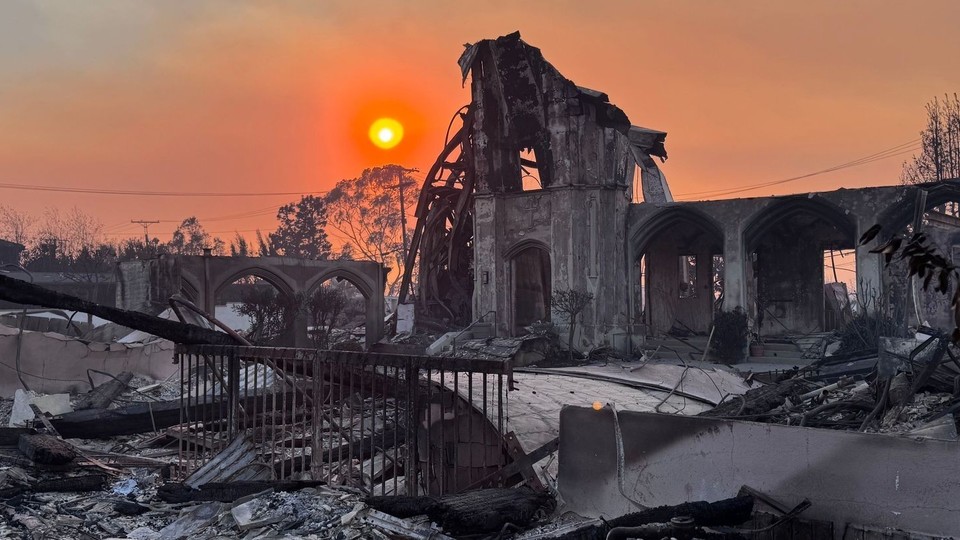
Rice offers replacement diplomas free of cost
The fires that have ravaged the Los Angeles area in the last month have caused an estimated $250 billion in damage and killed at least 29 people in Southern California according to media reports, affecting thousands of people’s lives including some of the nearly 1,300 Rice University alumni who reside in the area.
In response, a few Owl alums sprung into action, reaching out to assess needs and provide assistance.
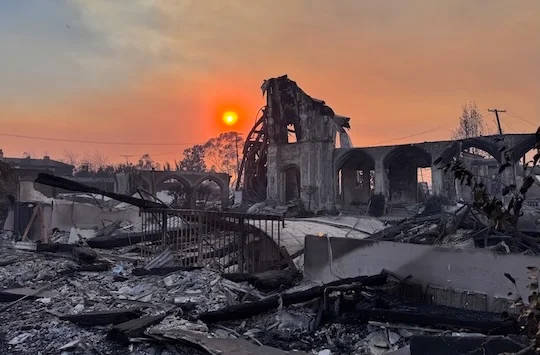
Ross Chitwood ’08, a music professor at the University of California, Los Angeles, had to move when his home and the church he works at as the director of worship and community in the Pacific Palisades neighborhood burned. He has since relocated to Venice, California, as his church congregation searches for a temporary location to hold services.
“It’s almost overwhelming to know where to go and what to do,” said Chitwood. “We’re trying to find ways as a church and a community to keep people together as much as possible.”
When a fellow Rice alum Ruth Reitmeier ’92, now the director of coaching for Rice’s Jones Graduate School of Business, reached out to Chitwood to see how she could help, he only had one request — that his diploma be replaced.
“When everything burned, everybody’s calling you asking what they can do, and you don’t really have an answer,” Chitwood said. “Ruth asked me what she could do, and I was like, ‘You could get my Rice diploma replaced.’ And she was on it — got it done that day.”
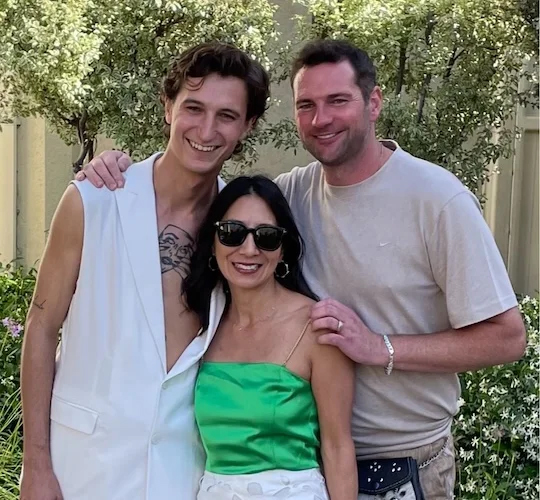
Reitmeier connected with Rice’s Office of Alumni Relations which then collaborated with the Office of the Registrar to arrange the replacement of his diploma, which was sent to a family member of Chitwood’s who lives near him.
“I love the Rice community because it’s small enough that a friend like Ruth could just make that happen,” Chitwood said. “There’s an enormous amount of bad that has happened, but the amount of good that’s come in far outweighs the bad. People have just been amazing and stepped up in ways that you couldn’t imagine, and everyone’s embracing their talents and really using those to find solutions for what to do in the short term.”
To assist alumni like Chitwood and other victims of the fires, Rice’s division of Development and Alumni Relations has teamed up with a few alumni volunteers in the Los Angeles area in an effort to meet the needs of fellow Owls created by the natural disaster.
“We know that a diploma can’t replace a home, but in this small way, Rice can support our alumni who lost so much in the Los Angeles fires,” said James Hurley, associate vice president of alumni relations. “I’m grateful to the Office of the Registrar, my team and our alumni volunteers for making this possible.”
Alumni volunteers like Howard Park ’91, who are part of the Los Angeles regional alumni group, have helped spark the grassroots effort to gauge the needs of victims in the Southern California area.
“I’ve been thinking a lot about how to grow and support the Rice community, and I think across the board there’s a lot of things that we could do to support,” Park said. “Then the fires broke out, and I know that we have Owls in Pasadena and Altadena and probably in the other areas as well, so I wanted to do something.”
Park and other alumni volunteers like Tania Min ’92, former president of the Association of Rice Alumni, organized efforts to get the message out to other Owls in need and match them up with alumni who can provide assistance.
“If you’ve been impacted in any way, just know that we have Owls around the world and around the country who are concerned and want to help,” Park said. “Even if it’s just getting the message out and sharing the information, that may be helpful. It’s just about knowing that people care.”
If you are a victim and would like to provide information about what you may need in recovering from the L.A. fires, please click here.
If you are a Rice Owl who would like to provide assistance, please click here.
If you have lost your Rice diploma in the fires, the Office of Alumni Relations will help you get a new one at no cost. Please contact Sofia Horadam-Kalmus at sh168@rice.edu for more information.
You May Also Like

Rice University’s Jesse H. Jones Graduate School of Business today announced the launch of its Graduate Certificate in Healthcare Management program, a 10-month, credit-bearing professional credential designed for current and aspiring leaders seeking deep expertise in the business of healthcare.
Brain health initiatives can learn from heart health, Rice Baker Institute expert says
A national commitment to improve the U.S. population’s brain health through research, education and investment can provide economic benefits, according to an expert from Rice University’s Baker Institute for Public Policy. An upcoming brain economy executive education course, supported by Rice Business, will be held April 7-10.
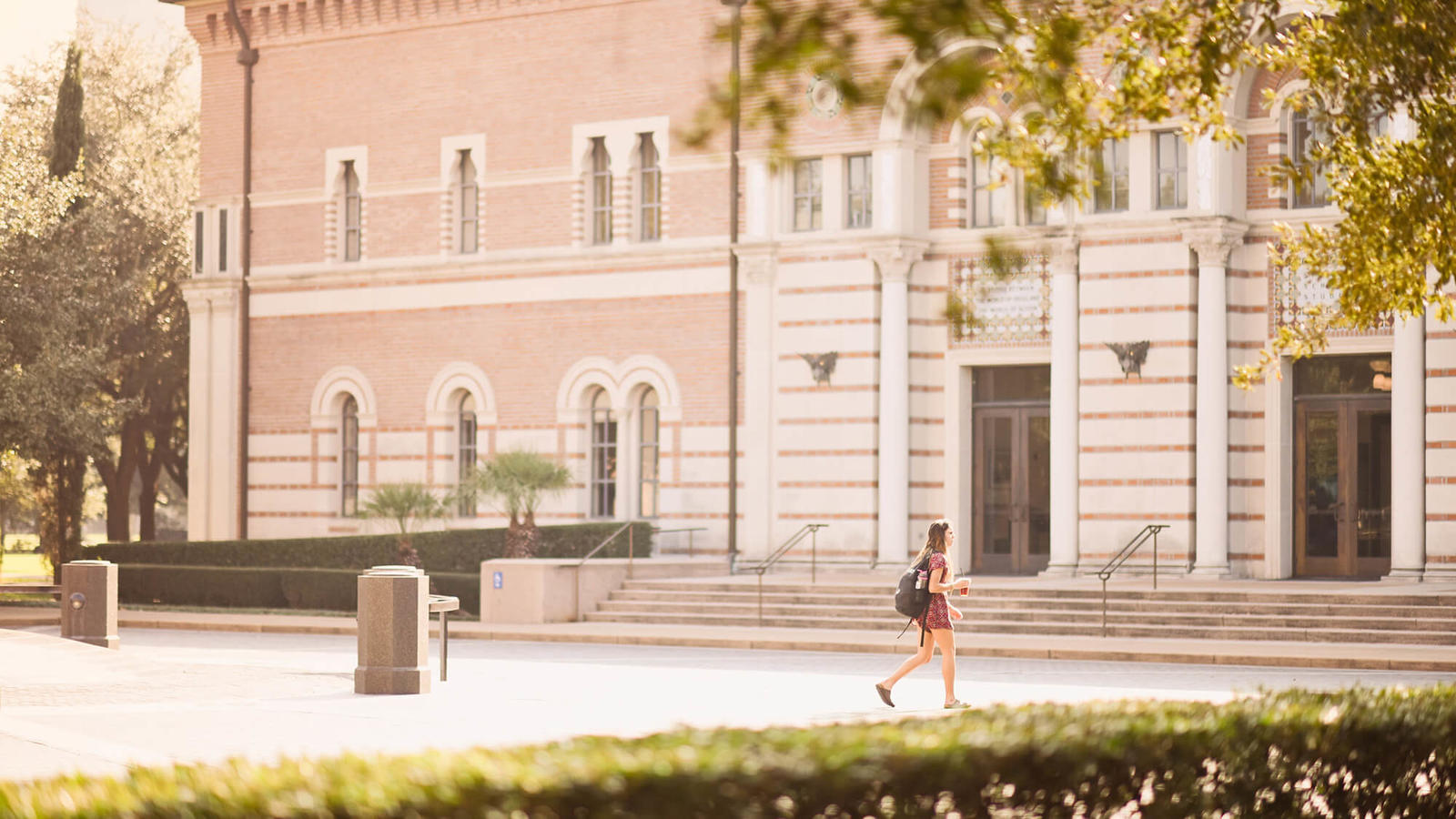
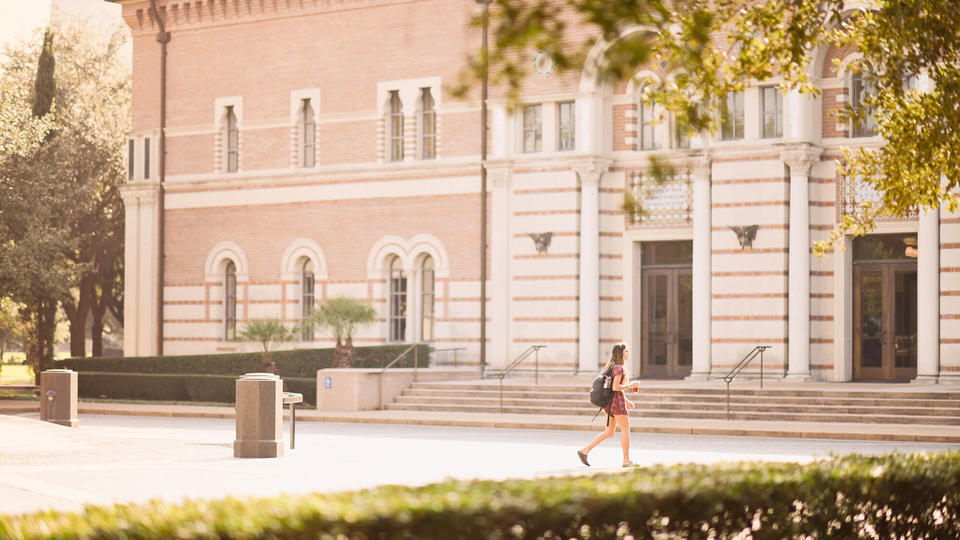
A national commitment to improve the U.S. population’s brain health through research, education and investment can provide economic benefits, according to an expert from Rice University’s Baker Institute for Public Policy.
Harris Eyre, lead of the Neuro-Policy Program and the Harry Z. Yan and Weiman Gao Senior Fellow in Brain Health at the Baker Institute, is dedicated to fostering awareness, knowledge, skills, tools and leadership for the brain economy across public, nonprofit and private sectors. During the successful Rice-sponsored Brain House at the World Economic Forum, he co-authored a commentary with the American Heart Association (AHA), a 100-year-old, storied American institution, arguing the organization is well-positioned to lead efforts in brain health given the close link between heart and brain health.
“Cardiovascular risk factors also impact brain health, and lifestyle choices promoting heart health such as exercise or a Mediterranean diet also benefit brain health. The AHA’s model for heart health, including public education, advocacy and research, could be adapted for brain health,” Eyre said. “Just as public awareness of cardiovascular disease has transitioned from focusing solely on acute adverse events, such as heart attacks and strokes, to educating people about the importance of a more positive conception of cardiovascular fitness, an approach to the brain focused on fitness in a more positive, less disease-oriented way may be timely.”
There’s a need for a multifaceted approach to brain health with a focus on science, addressing life-course changes, tackling social disparities and fostering interdisciplinary collaboration, Eyre said. Neuropsychiatric disorders are a leading cause of disability worldwide with around 3.4 billion people affected by conditions impacting the nervous system, according to the commentary. As the population ages, the prevalence of stroke, dementia and late-life depression is expected to grow.
“A broad effort, including partnerships with public health experts, policy makers and corporate leaders, is essential for maximizing the societal benefits of improved brain health and brain capital,” Eyre said.
Eyre argues that an interdisciplinary and multisectoral approach will be most successful. Reaching beyond science and medicine to include public health experts, leaders in child development and aging, policy makers and corporate leaders will ensure that investments are rooted in science and address disparities. Brain capital recognizes that improving a society’s health has economic benefits — healthy brain behaviors include creativity and entrepreneurship, social adaptability and resilience, productivity and innovation.
“Brain capital is like the economic concept of human capital but more directly relevant to the modern, information-based economy,” he said. “The brain fitness of individuals in companies and nations ensures a workforce and population optimally suited to thriving and tackling problems of the future — a brain-positive economic transformation would maximize the conditions that enhance neurological and mental wellness. Currently, brain capital is underdeveloped and insufficiently supported: There are regions with poor education, limited teaching of the arts and inadequate nutrition for healthy brain development.”
The brain is the human’s most vital organ yet typically ignored unless it is injured, diseased or declining, Eyre said, adding that even for those who are otherwise healthy adults, human bodies currently outlive human brains by 20-plus years.
“Improving the health of the human brain has been discussed since the [1990s], but the rise of mental illness and disease has placed brain health as a pivotal goal on the road toward enhancing population health more broadly,” he said. “But in order for us to achieve breakthroughs in brain health as we have in heart health, the field needs urgent attention from legislators and corporate leaders.”
With a background in medicine and neuroscience and more than 200 peer-reviewed scientific and policy papers to his name, Eyre has presented his work at the World Health Organization, the World Economic Forum in Davos, Switzerland, and the United Nations and has led initiatives with the National Institutes of Health, U.S. Congress and Texas policymakers on how government can lead a brain capital transformation. The McKinsey Health Institute has now made the brain economy a key pillar of its portfolio.
Eyre said he is currently setting his sights on three major projects, including a foresight project on systemic investing in the brain economy with the European Investment Bank Institute, the world’s largest public bank. The second project is a world-first, boutique brain economy executive education course at Rice Global Paris Center April 7-10 with support from the Baker Institute, Rice Global and Rice’s Jones Graduate School of Business. The third project is a flagship brain economy event to be held at the Shell Woodcreek Campus May 21 and 22. Partners include Rice, the Greater Houston Partnership and the University of Texas Medical Branch.
“An Advocacy Agenda for the Human Brain: Moving From Brain Health to Brain Capital,” published in Circulation, an AHA journal, Jan. 21 and was co-authored with Mitchell Elkind, AHA chief clinical science officer, and Cheryl Pegus, AHA board member.
You May Also Like

Rice University’s Jesse H. Jones Graduate School of Business today announced the launch of its Graduate Certificate in Healthcare Management program, a 10-month, credit-bearing professional credential designed for current and aspiring leaders seeking deep expertise in the business of healthcare.
5 Things We Heard From Companies This Week
Want to know which industries are hiring, what skills employers care about most, and how Rice MBAs stand out? Here’s what recruiters are saying — and how you can make the most of every opportunity.
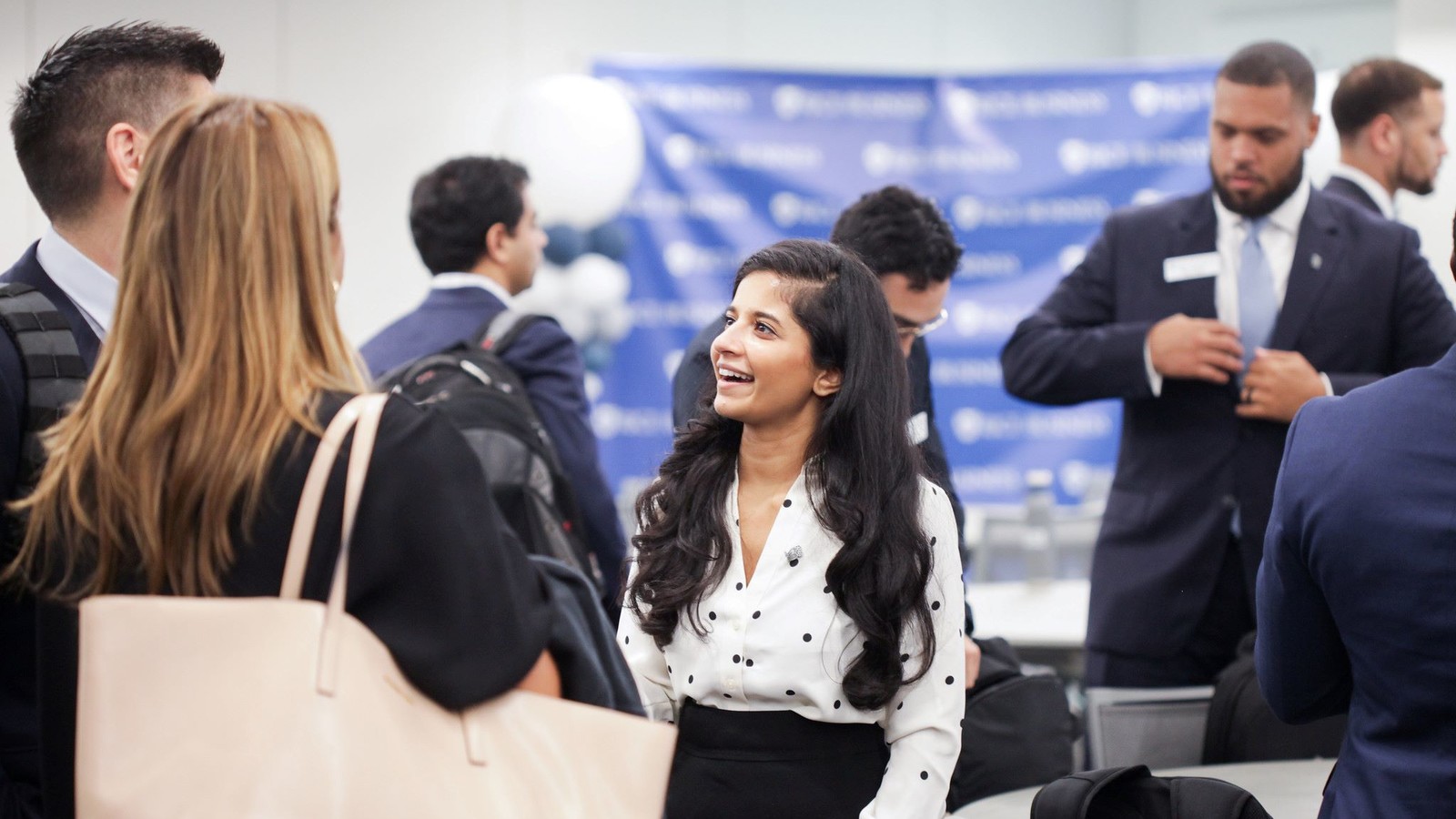
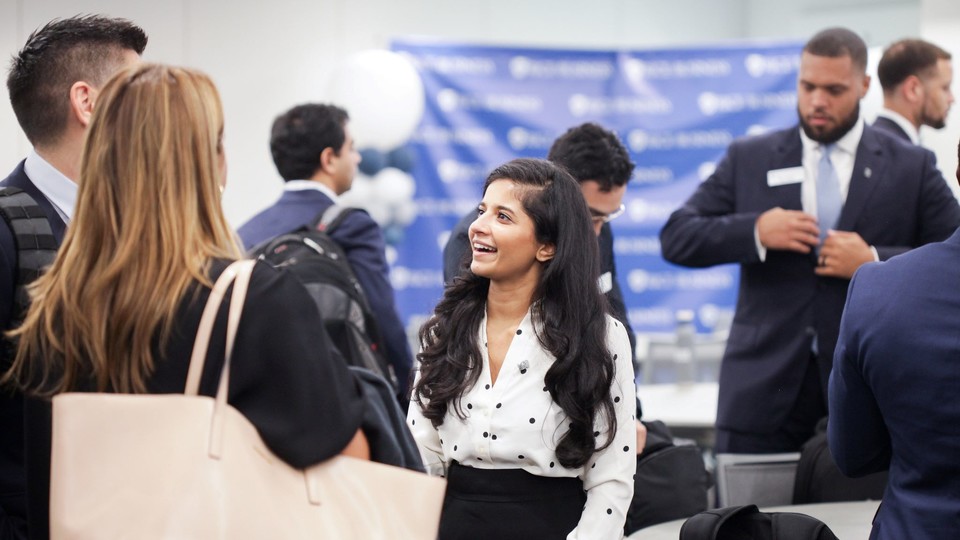
As recruitment season heats up, it’s essential to stay ahead of the curve and understand exactly what companies are looking for in MBA candidates. This week, we heard directly from recruiters about the current job market, the industries with the most interest, and the skills that make a difference in the hiring process.
From navigating a competitive market to making the most of every networking opportunity, here are five key takeaways for Rice Business students.
1. Companies are eager to hire in key industries.
A diverse range of employers visited campus this year, but the hottest industries remain consulting, finance, banking and energy. Students have met recruiters from top companies — like BCG, Chevron and Goldman Sachs — and smaller, local firms alike.
In finance, we discovered the most sought-after roles are in:
- Financial services
- Financial analysis
- Private equity/venture capital
- Investment banking
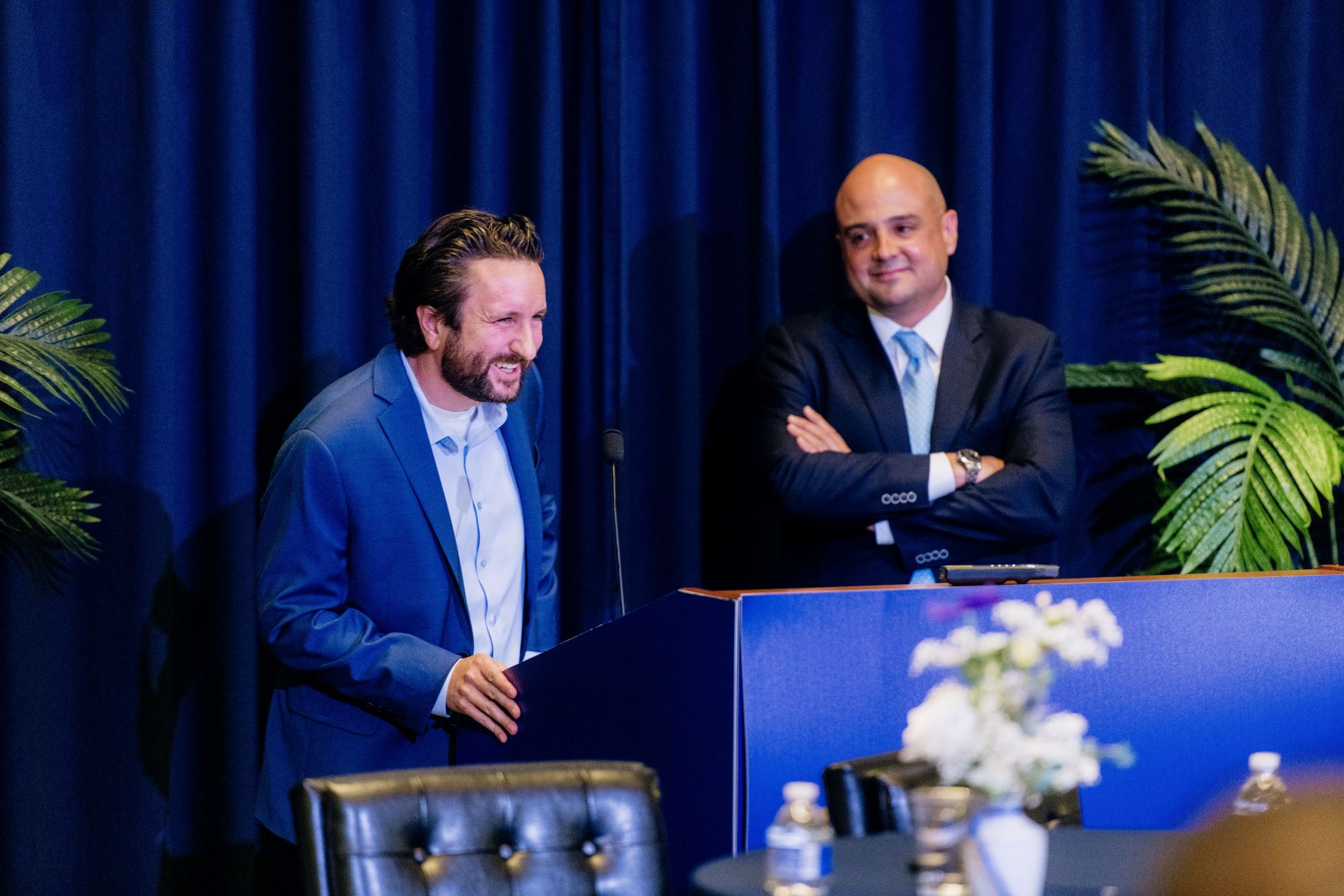
Many energy companies, we learned, are particularly focused on filling roles in:
- Corporate finance
- Supply chain
- Corporate development
- Business development
Whether you’re targeting a global firm or a niche opportunity, employers are eager to connect with Rice Business students.
2. The job market is competitive, but opportunities are still there.
While certain industries, like tech and consulting, are shifting, companies are still hiring — especially for MBAs. The key is to play to your strengths and stay adaptable.
In tech, for example, hiring can be a bit unpredictable. Companies like Microsoft and Google may prioritize candidates with demonstrated professional experience in the industry, but other tech firms continue to value the diverse skill set and leadership potential our students bring to the table.
Interested in Rice Business?
3. Soft skills matter as much as technical skills.
Recruiters emphasized that leadership and communication skills are highly valued — especially when combined with strong technical skills. Rice MBAs have an edge here, thanks to hands-on learning opportunities like global experiences and real-world projects. When you combine your classroom knowledge, professional experience and soft skills, you bring a unique and valuable perspective. Employers notice.
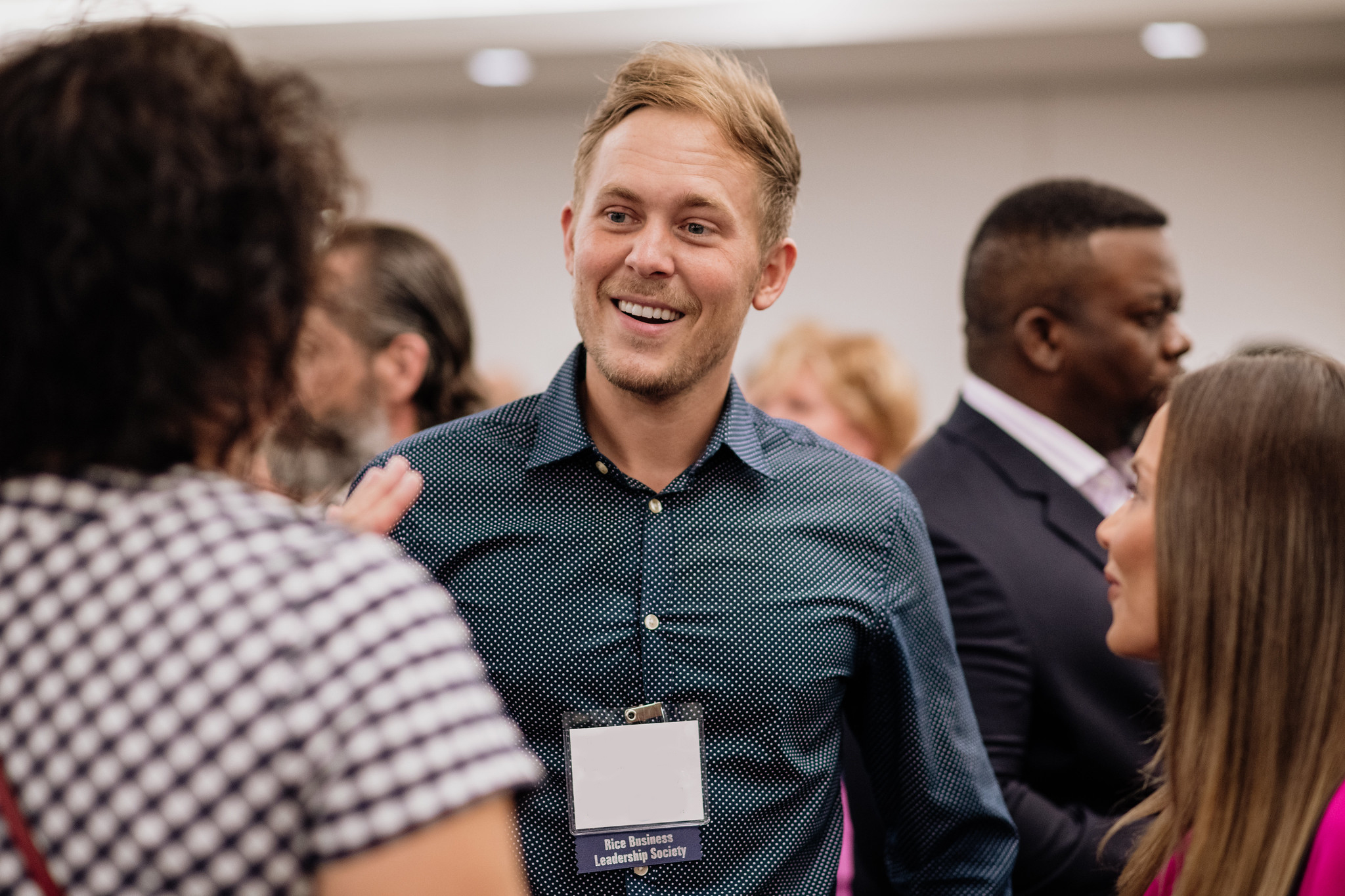
4. Your network is only as valuable as your effort.
A strong alumni network can open doors, but preparation makes the difference. Alumni play a key role in connecting students to opportunities, so approach these conversations intentionally.
Pro tips for coffee chats, networking opportunities and alumni conversations:
- Do your research. Learn about the company, industry and role beforehand to stand out and feel confident.
- Set goals. Is there a particular person you want to connect with? A specific question that you’re searching for an answer to? Be intentional in your approach.
- Play to your strengths. Leverage your unique experiences and insights from your MBA courses in every interaction.
Take advantage of every opportunity to connect with alumni, recruiters and peers. The relationships you build now will shape your path forward.
5. Be ready to make an immediate impact.
Most recruiters are searching for candidates who can add value to their team from day one. Foster a proactive mindset and highlight how your unique skills and experiences have equipped you to effectively tackle real-world challenges.
Confidence, paired with a clear understanding of the company and role, can help you stand out in a competitive market.
The Bottom Line:
The recruiting process isn’t easy, but you’re not in it alone. With preparation, dedication and support from our Career Development Office and the Rice Business community, you can make the most of this recruitment season. Put in the time and effort now, and it will pay off in the career you’re working toward.
